#Examples of performance Marketing Strategies :-
Explore tagged Tumblr posts
Text
Why Performance Marketing is Important
What is Performance Marketing??
The only method of advertising where a business pays only for results achieved is performance marketing. The organization pays on a specific measure for results like clicks, leads or sales. unlike the other impressions based on the form of advertisement, this links expenditure directly to results generated, thus, the clear ROI that is produced..
Benefits of Performance Marketing...
Measurable Results
Clear and measurable, performance marketing provides real-time knowledge to the companies as to how each of their campaigns performs. Transparency allows the marketer to continuously adapt to the strategies that work best.
Cost-Effective
Businesses only pay for desired actions, like clicks or conversions performance, because of this … Performance marketing is the cost-effective method of making sure marketing budgets are used wisely on audiences that are most likely to engage and convert.
Targeted Reach
It allows targeting the audience more effectively and accurately on demographics, interest and behavior. Reaching the target audience fosters effective campaigns ,thus working with needed people and relevant messages.
Flaxibility & Scalibility
Campaign performance data also allows marketers to to rapidly adjust campaigns in order to optimize their result, It allows businesses to scale marketing effectively as they grow.
Improved ROI
It helps gain a higher ROI compared to traditional marketing methods. Due to the efficiency in spending, there was better overall profitability because of it. It was focused on measurable outcomes and optimized campaigns based on performance data.
<a>
Benefits of Performance Marketing...
</a>
#Benefits of Performance Marketing...#Why Performance Marketing is Important#What is Performance Marketing??#Cost-Effective#Targeted Reach#Improved ROI#Pay Per- Click Advertising#Affiliate Marketing#E-Mail Marketing#Search Engine Marketing#Examples of performance Marketing Strategies :-
0 notes
Text
youtube
My Best Strategy To Power Through Business Plateaus
Business plateaus are periods of stagnation or slow growth in a company's operations, revenue, or overall performance. They can occur for various reasons and at different stages of a business's lifecycle. Overcoming these plateaus is crucial for sustaining and expanding a successful business
#business performance#continuous business improvement#business improvement examples#marketing and sales optimization#lack of innovation#juliesolomon#networking and partnerships#product development#competitive analysis#adaptation and change#customer retention#management and leadership#financial management#marketing and promotion#my best strategy to power through business plateaus#business plateaus#business growth#business development#Business Plateaus#Youtube
0 notes
Text
Juno persona chart
mercury in the houses

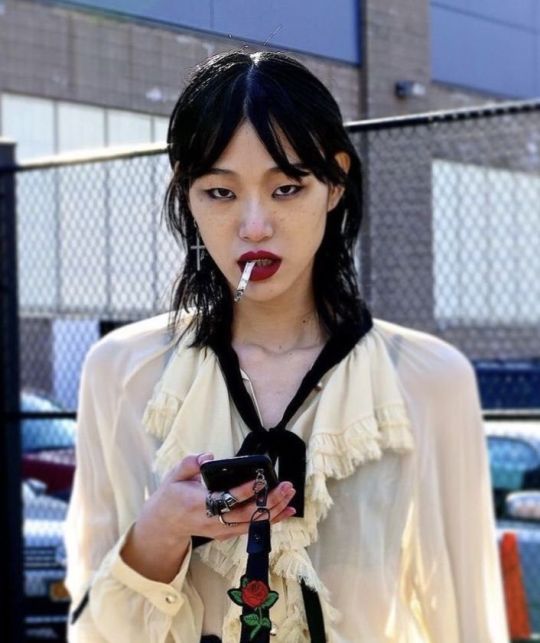
what is a juno persona chart? looking into juno persona chart gives more detailed insight of how the relationship and marriage overall of you and your spouse will be like. it also describes them in a sense as well. The Greek Goddess Juno is described to rule over love and marriage and hence why the asteroid is looked into for that theme.
mercury is a planet of communication, the mind and the way one talks about things. mercury in the juno persona chart gives insight on how the couple communicates and the mental connection between the two.

reminder: this is my interpretation from observations and first hand experiences, so don't take this to heart.

mercury in 1st house: since this house is ruled by mars lots of quick speech and lots of quick thinking within the marriage. lots of arguing and conflict when it comes to words like using vulgar language quite often and so on. They can quickly grow bored with routine and may need continual mental stimulation and excitement. They like expressing their thoughts, opinions, and ideas with others and may have a natural knack for public speaking or performing arts. They may influence people with their words and thoughts so they can easily get what they want from their partner. ego can be very pungent during communication, so you show your true self when in depth of conversation with your partner and are very ethical and true to what you say.
spouse may have their natal mercury in aries, 1st house, fire sign, fire house (1,5,9)
mercury in 2nd house: each party's thought process is very structured and this is the perfect example of thinking before speaking. whatever comes out of this placements mouth is meaningful and important. speaking pace may be sensual and slow, very clear communication between the two. likely to state the obvious and most predictable and logical things. this placements doesn't like to complicate things so they just get to the point. They may love looking into investment possibilities, analysing market trends, and developing smart financial strategies to increase their wealth and security. This placement may cause money-related anxiety or tension, particularly if they believe they have little control over their financial status so discussions about finance to their partner is common.
spouse may have their natal mercury in taurus, 2nd house, earth sign, earth house (2,6,10)
mercury in 3rd house: communication is very forward and free. no hesitations when it comes to talking to each other. talking is a very important part of the relationship and when something happens the couple just need to talk it out. its all about talking it out. it can be quite damaging actually if there is a block in free communication. Shared interests in studying, reading, and debating diverse topics might be a strong bonding aspect in their relationships. This location indicates versatility and flexibility in communication approaches. Individuals may readily change their method of expressing themselves to fit different situations to their other half. They are more inclined to appreciate their partner if they are as adaptable and open-minded in their communication style.
spouse may have their natal mercury in gemini, 3rd house, air sign, air house (3,7,11)
mercury in 4th house: lots of open and honest communicative styles for this placement. sensitive topics may be a theme for this placement also. both party's communicate with a respectable and loving matter for the other person. including family members or talking about them is common. The individual may come from a household that values open communication and engages in frequent conversation, debate, and idea sharing from what they learnt from their household. They may have learnt to express themselves vocally from an early age and are comfortable conversing with family members. They may find it easier to express their feelings verbally rather than physically, and they may seek intellectual relationships with family members to meet their emotional demands. They may also be prone to overanalysing or intellectualising their emotions in order to gain a better understanding of their partner.
spouse may have their natal mercury in cancer, 4th house, water sign, water house (4,8,12)
mercury in 5th house: very playful and unserious topics can be talked about in the relationship. this placements communication style is quite sensual but very fun and playful, which of course leads to arguments so be careful with that. They may have a way with words that is fascinating and captivating, making them exceptional storytellers. They may also have a sense of humour and wit, and they use words to express themselves and entertain others. These people can exhibit their creativity through writing, public speaking, acting, or any other means of self-expression. They may have a natural flair for presenting their thoughts in innovative and engaging ways, which sets them apart in artistic endeavours. They may love flirting, light-hearted bantering, and verbal expressions of affection. They may also value their intellectual relationship with heir partner and like engaging in fascinating talks.
spouse may have their natal mercury in leo, 5th house, fire sign, fire house (1,5,9)
mercury in 6th house: this placement enjoys mental stimulation and is constantly working their mind. for example in marriage, when going on about the day, this placement cant take their mind of what they did before they left the house, like thinking if they turned off the lights or if they locked the door and so on. lots of precautions and overthinking for this placement. which leads to being critical in everything that they say, like after a conversation between both parties this placement rethinks the whole speaking process and thinks of what they could have said and what they said that was wrong. likely to debate on practical things like where to go for grocery shopping or what gym to go to and so on. lots of conversations about work and routine for example asking 'how was your day', 'how was work?' and so forth. daily check ins and having a routine with their conversations are common. very honest when it comes to health matters, if they are worried about their partners health they take initiative.
spouse may have their natal mercury in virgo, 6th house, earth sign, earth house (2,6,10)
mercury in 7th house: They may express themselves freely and honestly to their partners while expecting the same amount of communication in return. Clear and honest communication is critical to sustaining harmony in their relationships. They may examine the benefits and drawbacks of their relationships, assess their compatibility, and use logic to better comprehend their partner's point of view. These people may be open to new ideas, prepared to negotiate, and find concessions in disagreements. They can readily tailor their communication style to the demands of their partners. They may settle issues by good conversation, identifying common ground, and achieving mutually beneficial agreements. Individuals may need to avoid being overly critical or nit-picky in their relationships with partners.
spouse may have their natal mercury in libra, 7th house, air sign, air house (3,7,11)
mercury in 8th house: very very intense topics. communication is very deep and spiritually inclined. lots of talks about taboo things that others may not feel comfortable with. communication can be full of secrets, discovery of each other throughout communication. this is a very 'i want to know all of who you are' kind of placement. very intense. questions everything about their partner to the tiniest detail. They want to understand the psychological undercurrents of their relationships and are interested in themes that delve into the depths of human experience. Communication in these partnerships is passionate, intimate, and transforming. Their intellectual curiosity motivates them to seek out hidden truths and go into the unknown, both inside themselves and in their relationship. They are more inclined to discuss common money, investments, or shared objectives, in order to build trust and mutual understanding in their marriage. They may be adept at expressing their deepest ideas and feelings, establishing intimacy and trust in their relationships via open and honest communication. They recognise the power of words to heal, empower, and promote progress, and they may actively strive to utilise communication as a tool for personal and relationship development. These people may be drawn to therapy or counselling for personal or professional reasons, and they may have an innate ability to recognise the underlying motivations and dynamics in their interactions.
spouse may have their natal mercury in scorpio, 8th house, water sign, water house (4,8,12)
mercury in 9th house: These folks' relationships rely heavily on deep, meaningful talks and the exchange of ideas. They are prone to admire conversations about broad opinions and an interest in investigating a variety of topics, such as philosophy, religion, or cultural differences. They can show their love and affection through vocal expression, exchanging ideas, and participating in debates or conversations. They value communications that are exhibited well and articulate their thoughts clearly. Travelling together or participating in educational activities as a couple may strengthen their relationship and promote mutual understanding. They may also be in long-distance relationships, having met their spouses while travelling or studying overseas. They like sharing their expertise and experiences with their partner and may feel satisfaction in assisting them to learn and grow. They also value their partner who can teach them new things and widen their horizons. Their connections may include a variety of cultural influences and intellectual hobbies, which enriches their shared experiences.
spouse may have their natal mercury in sagittarius, 9th house, fire sign, fire house (1,5,9)
mercury in 10th house: You and your partner may have a strong cerebral connection and like discussing, debating, and exchanging ideas. both party's perception is intelligent, intellectually fascinating, and capable of participating in meaningful talks. You and your spouse may assist each other's job ambitions by providing practical advice and networking opportunities. Your connection may be tied to your public image or require professional collaboration. You and your partner may approach difficulties logically, using facts and analysis to identify answers. You may also be skilled at talking with authoritative people or navigating professional situations together. Engaging in intellectual pursuits like studying, attending workshops, or discussing ideas helps to improve your partnership. You may also be concerned about how society perceives your relationship and how it affects your own reputations. You may need to be careful not to allow work-related stress or goals dominate the quality time you spend with your partner.
spouse may have their natal mercury in capricorn, 10th house, earth sign, earth house (2,6,10)
mercury in 11th house: communication style is unique for the both of you. maybe it's not something you are used to nor they are either. its a you and them only thing. lots of texting and messages can be sent in marriage, so even when you are not together you still get the time to communicate with them through your phone. lots of speaking with other people like social groups, work, colleagues that you haven't before. Individuals may clearly and precisely describe their future visions, communicating their intentions to others through verbal or writing means. They may also seek comments and advice from their social group in order to refine their goals. Individuals are more inclined to accept fresh ideas, differing viewpoints from their partner. They may be drawn to unorthodox or avant-garde ideas that challenge standard thinking.
spouse may have their natal mercury in aquarius, 11th house, air sign, air house (3,7,11)
mercury in 12th house: Individuals with this placement may have a highly intuitive and attentive communication style, catching up on subtle hints and nonverbal signs. They may have an innate ability to grasp unsaid thoughts and feelings, making them skilled at empathising and providing support in the relationship. this might suggest a preference for secrecy or prudence in communicating. These people may choose to keep certain thoughts and ideas to themselves or express them exclusively in private circumstances. They may be hesitant about disclosing too much about oneself, preferring to retain an air of mystery or seclusion in their dealings. so communication between the couple is very peaceful and intuitive. Individuals with this placement may thrive in areas requiring artistic expression, such as writing, poetry, music, or visual arts. lots of love notes and creating art dedicated to their partner is their love language. These individuals may have a great understanding of the human mind, including their own their partners underlying motives. They may be interested in psychology, psychotherapy, or other disciplines that deal with the complexity of human behaviour and emotions. They may have a natural capacity to connect with their instincts and gut sensations, which may help them navigate the hidden intricacies of relationships. They may also find fulfilment in discussing spiritual or philosophical issues, hoping to get a better grasp of the mysteries of existence.
spouse may have their natal mercury in pisces, 12th house, water sign, water house (4,8,12)
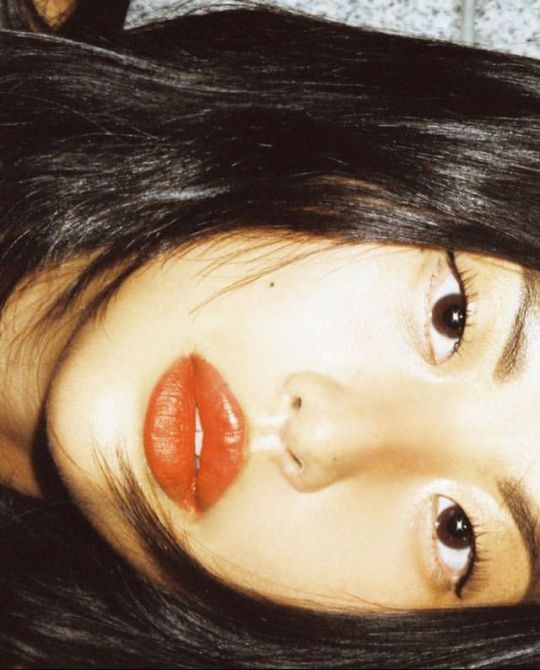

thanks for reading 🫶🏻have a nice day🤍
#juno persona chart#mercury#houses in astrology#astrology#astrology community#astrology observations#sidereal astrology#vedic astrology#zodiac#astro community#astro observations#12th house#astrology readings#kpop astrology#celebrity astrology#persona chart#birth chart#natal chart#astrology chart#fs#future spouse
2K notes
·
View notes
Note
I know a lot of people didn't like it for understandable reasons but I really enjoyed 4th Ed dnds combat. Although this comes from a long time warhammer enjoyer. My current fave rpg is lancer which probabaly tells you about my proclivites
(BTW is tiny frog wizards compatible with like salamanders, newts and axolotl and other such small amphibians?)
From the perspective of pure design, Dungeons & Dragons 4th Edition is probably the finest piece of work Wizards of the Coast has ever produced, and among the more accomplished examples of game design in the hobby as a whole. A certain subset of the hobby have made it a cornerstone of their personalities to performatively disapprove of what 4E does, but it does it very well.
(Also, the extent to which 4E was poorly regarded for its content is greatly exaggerated. I go into the timeline of events in some detail in this post here; the short version is that the greater part of the 4E "edition war" sprang from a marketing strategy by one of WotC's competitors, which ended up succeeding beyond their expectations due to a series of clownshoes blunders by Hasbro regarding 4E's rollout, promotion and licensing – a lot of people forget that the recent business with the OGL 1.1 isn't the first time Hasbro has attempted that particular brand of fuckery! The perception that 4E was disliked because it was badly designed is largely the product of a tiny but highly vocal core of edition-warring grognards taking advantage of the fact that most people don't remember the real reasons that 4E commercially underperformed to push a false narrative.)
1K notes
·
View notes
Text
Sasuke and Japanese Masculinity
There are some Naruto/Sasuke blogs that I encounter and I am in agreement with some of their analysis but one of the ideas perpetuated by them is the idea that Sasuke is the feminine counterpart to Naruto' s masculine one or that he has characteristics typical of a "heroine", which I can not agree with.
Let's start with one of the most baffling claims that I have come across -
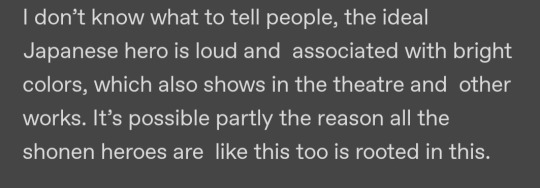
This conclusion can only arise from a narrow engagement with Japanese media—specifically, post-1980s shounen manga or tokusatsu TV shows. To equate the theatrical use of bright colors in Kabuki with modern shounen protagonists’ personalities is a fundamental misunderstanding of both cultural history and artistic tradition.
Kabuki theater, does feature characters adorned in exaggerated makeup and vibrant costumes. However, these visual elements are not tied to personality traits like “loudness” or “rebelliousness.” Instead, they serve as symbolic tools to convey roles, emotions, and social status within the rigid structure of Kabuki performances. The protagonist in Kabuki is often a figure of restraint, dignity, and moral complexity—qualities starkly opposed to the brash, impulsive archetype of modern shounen heroes. Importantly, all Kabuki characters—heroes, villains, and supporting roles alike—wear bright colors and stylized makeup. This is a theatrical convention, not a character trait.
The conflation of Kabuki’s visual style with shounen protagonists’ personalities reveals a superficial understanding of it. The vibrant aesthetics of Kabuki are rooted in theatrical tradition, not character archetypes.They are part of a broader theatrical tradition that emphasizes visual storytelling and emotional expression. Meanwhile, the loud, brash shounen hero is a modern invention designed to resonate with younger audiences, not a reflection of Japan’s historical ideals.
"The Ideal Japanese Hero"
The term “ideal Japanese hero” is overly broad and ahistorical. It ignores the evolution of Japanese storytelling across genres and eras. The traits commonly associated with modern shounen protagonists—short tempers, hyperactiveness , or “punkish” behavior—are relatively recent developments, emerging in the late 20th century to appeal to adolescent demographics. These characteristics are often criticized within Japan as immature or simplistic, reflecting a deliberate marketing strategy rather than a cultural ideal.
In contrast, seinen and gekiga feature protagonists who embody a far more nuanced conception of masculinity. Characters like Manji from Blade of the Immortal , Musashi from Vagabond, or Thorfinn from Vinland Saga are introspective, morally conflicted, and driven by existential struggles. These figures align more closely with the Byronic hero—a brooding, complex antihero—than with the loud, hyperactive protagonists of shounen.
Sasuke : Revenge and Restoring Honour
The themes of revenge and the restoration of honor are deeply embedded in classical Japanese literature, so much so that there is an entire genre dedicated to it: Jitsuroku. These stories, often based on historical events, revolve around the pursuit of justice and the restoration of one’s honor through acts of vengeance. The most iconic example of this genre is the tale of the Forty-Seven Ronin, a story that has become a cornerstone of Japanese cultural heritage. It tells the story of a group of samurai who avenge their lord’s death after he is wrongfully framed and forced to commit ritual suicide by a political rival. The themes of loyalty, filial piety, and the moral imperative to restore honor are central to this narrative, and it has inspired countless similar stories throughout Japanese history.
The archetype of the wronged hero seeking vengeance is a recurring motif in Japanese literature. These stories often follow a similar structure: a protagonist is wronged due to political machinations or personal betrayal, resulting in dishonor and often death. The hero then embarks on a quest to avenge the injustice, driven by a sense of duty, loyalty, or filial piety.
One such example is Tales of Jiraiya, a classic Japanese folktale that served as one of the many inspirations for Naruto. In this story, the protagonist, Jiraiya, is a noble warrior who faces betrayal and must navigate a world of political intrigue and personal vendettas.
Sasuke is a textbook example of this archetype. His quest to avenge his family and restore their honor drives much of his character arc, making him a quintessential example of the classical Japanese male protagonist.
Despite being a deuteragonist, Sasuke’s role in Naruto is so compelling that he often challenges Naruto’s position as the protagonist, both within the narrative and in terms of audience reception. During the run of Naruto in Weekly Shounen Jump, Sasuke consistently ranked highly in popularity polls, and even surpassing Naruto to take the #1 position at least once. His character and story arc resonated deeply with Japanese audiences because they embodied the characteristics of a classical Japanese hero: stoic, driven, and principled.
Naruto, while a beloved protagonist, is often critiqued for his naivety and near-childish idealism. His unwavering belief in forgiveness and unity, contrasts with Sasuke’s capacity for ideological introspection.Sasuke makes for a more mature and nuanced counterpart to Naruto, appealing to audiences who appreciate the gravitas of a traditional tragic hero.
Some blogs and fans insist on framing Sasuke as a “heroine,” citing a comment from an anime director ( from early part 1, referencing Naruto wanting to save Sasuke from Orochimaru) who said that Sasuke is the “true heroine” because Naruto “chases” and wants to “rescue” him. This interpretation reduces their relationship to a rather shallow dynamic of pursuer and pursued, ignoring the larger narrative in the relationship( especially considering Sasuke never actually required physical saving despite Naruto’s concerns)
However, you can also easily and equally claim that Naruto fulfills the narrative role traditionally assigned to female love interests in East Asian stories – the emotional crutch that enables the lone ranger’s salvation.
“Women heal through devotion and Men are redeemed by their influence”
Sasuke embodies the quintessential lone-ranger archetype : Defined by self-imposed isolation, governed by ruthless independence and consumed by a quest for vengeance
Naruto, meanwhile, assumes the role of the redemptive force, responsible for his emotional healing.His narrative purpose is mirrored across many East Asian romances:
In Tale of Genji, Murasaki becomes Genji’s emotional compass, she counters his political ruthlessness.
“She was the only one who truly understood his heart”
Like Murasaki, Naruto alone comprehends Sasuke’s pain and refuses to abandon him.
In Peony Pavilion, Dun Liniang’s love redeems the scholar Liu Mengmei and her devotion awakens him from his isolation. In The White Snake legend, Bai Suzhen’s love humanizes the ascetic Xu Xian, her devotion breaks his monastic detachment.
There are many more examples, but the pattern is clear. In the story itself, Naruto's devotional speech to Sasuke is modeled after Hinata's speech to himself - both were fixations formed in childhood by watching from afar, both involve wanting to be like the other person and surpass them, and both end with declarations of dying for or with that person. Naruto is also contrasted to Sakura - the female character who is canonically in love with Sasuke and is expected to take the role of being Sasuke's emotional anchor- laments that she can't influence him through her love, and that role is given to Naruto instead.
In Chinese fan discussions, many have noted how Naruto – as the male protagonist – occupies the role of being Sasuke’s salvation, a narrative position traditionally reserved for female love interests.

Which second male lead tells the male lead, ‘You’re my salvation’ ?!
26K Likes
Naruto’s unwavering devotion to Sasuke frequently becomes a target of mockery, particularly among male fans who identify with him. As I've previously analyzed, this discomfort stems from seeing their self-insert character deviate from traditional masculine ideals by assuming what they perceive as a ‘feminine’ role – the emotional pursuer in the relationship. This cognitive dissonance manifests in two ways: either through hatred toward Sasuke for ‘making Naruto appear gay,’ or insisting that Sasuke should have been female to preserve conventional gender dynamics and avoid perceived emasculation.
Just to be clear, emotional nurturance isn’t gendered, but storytelling traditions have historically framed it that way. I’m not arguing that Naruto should be viewed as Sasuke’s ‘heroine’ instead of the reverse. The more compelling point is how the Naruto-Sasuke relationship also subverts the expectations of a the masculine archetype, and making Naruto an atypical Shounen protagonist.
I do remember JP fans discussing Naruto’s behaviour towards Sasuke and complaining that the way Kishimoto writes him resembles the writing a Shoujo author.

> It was funny how all the supposedly ‘typical attributes of female manga artists’ perfectly matched Kishimoto’s depictions when someone listed them.
>>Kishimoto is great in a sense, for proving that depiction habits are not gender specific
It's amusing when people cite Japanese fans calling Sasuke “heroine” as proof he supposedly occupies a feminine role. As I’ve explained in the comments, “heroine” typically just means the protagonist’s love interest – usually female, yes, but not inherently about performing femininity in the story.
Take this Japanese comment on a Final Fantasy VII clip about Sephiroth being the “heroine.”

Nobody seriously argues Sephiroth plays a feminine role, even though Cloud obsesses over him (antagonistically), once idolized him, admires his looks, and Sephiroth’s beauty keeps getting emphasized. Clearly, it’s just a tongue-in-cheek remark about their homoerotic tension.
The same applies to Sasuke. A lot of these “heroine” comments are playful nods to his narrative function as Naruto’s emotional focus, not some statement about gender roles in the story.
The claim that Sasuke’s status as a bishounen (beautiful, graceful male) makes him the “feminine counterpart” to Naruto’s “masculine” Yang energy is a misapplication of the Yin-Yang analogy. In Naruto, the Yin-Yang dichotomy is explicitly tied to thematic contrasts of darkness/hatred (Yin) and light/love(Yang), not to gendered traits or appearances. Reducing this philosophical framework to superficial characteristics ignores both the manga’s intent and the cultural context.
Kishimoto employs Yin-Yang symbolism to explore moral dualities:
Sasuke as Yin : Associated with darkness, vengeance, and isolation due to his role as an antagonist and his internal struggles.
Naruto as Yang : Embodies light, hope, and connection as the protagonist who seeks to unify the shinobi world.
This contrast is ideological, not aesthetic.
In Taoist philosophy, Yin and Yang are interdependent forces that create balance. Kishimoto uses this duality to frame their narrative roles, not their personalities:
- Sasuke’s Yin energy stems from his antagonistic position , not his appearance.
- Naruto’s Yang energy reflects his protagonist role as a unifier, not his brashness.
Kishimoto never extends the Yin-Yang analogy to their looks or behavior, this is a fan-imposed interpretation.
People who label Sasuke’s grace, beauty, or reserve as “feminine” misunderstand Japanese cultural ideals. In Japan:
-Bishounen aesthetics (youthful beauty, androgyny) are celebrated as markers of sublime masculinity, not femininity. Historical figures like samurai and nobles prized elegance and refinement.
- Stoicism and introspection are hallmarks of classical heroes
Sasuke and Naruto’s outwards characterization is not unique anyways . Iconic rivalries like Rukawa and Sakuragi (Slam Dunk, another inspiration for Naruto) follow a similar pattern:
Sasuke’s demeanor aligns with these ideals. His poise and strategic ruthlessness , and qualities that drive him to dismantle the Shinobi system are inherently Yang traits: active, decisive, and transformative. Conversely, Naruto’s compassion and loyalty to the village reflect Yin qualities: nurturing, passive, and preservative. Once again, you can easily inverse their assigned roles.
- Rukawa : Aloof, refined, popular (akin to Sasuke).
- Sakuragi : Loud, brash, and comedic (akin to Naruto).
These contrasts are narrative tools. Mapping them to Yin-Yang binaries ignores their purpose as simple character foils.
Sasuke's Desirability and Beauty
One of the most persistent and misguided arguments used to frame Sasuke as a “heroine” hinges on his desirability and physical beauty. They claim that because Sasuke is desired by multiple characters and his appearance is frequently emphasized, he must occupy a traditionally “feminine” role akin to a female love interest. This interpretation reflects a profound ignorance of Japanese literary and cultural traditions that celebrate male beauty as a marker of masculine excellence.
Japanese literature has long exalted male beauty, associating it with nobility, power, and otherworldly perfection. The seminal Tale of Genji, centers on Hikaru Genji, a protagonist whose beauty is described as transcendent:
“His appearance tempted men and women alike, as he had smooth white skin and an excellent fashion sense, which increased his fame and popularity.”
Genji’s allure is central to his character, yet it never undermines his masculinity. Instead, his beauty amplifies his status as an aristocratic ideal - charismatic, politically astute, and socially dominant.
It brings me to the next topic:
Bishounen
The term bishounen (美少年, “beautiful youth”) is frequently misrepresented in Western discourse as synonymous with effeminacy. In contemporary usage, bishounen is a fluid aesthetic category that transcends genre and sexuality:
- In shoujo manga: Bishounen are romantic leads
- In shounen/seinen manga: They appear as rivals antagonists , or sometimes even as the protagonists
- In Boys’ Love (BL): While often the central cast, their appeal lies in narrative dynamics, not inherent femininity.
“Comics for younger boys tend to use arrogant bishōnen in the role of the recurring minor rivals readers love to hate, though their effeminate good looks there, they will often appear older... stronger, and thus in fact more masculine than the commonly shorter and less mature protagonists. ”
-Manga: The Complete Guide, Del Rey
Critically, bishounen aesthetics prioritize androgyny - not gender ambiguity. These characters are unmistakably male, blending refined features with traditionally masculine traits (e.g., ambition, combat prowess). Sasuke exemplifies this balance: His fine features contrast with his lethal combat skills, strategic intellect, and ideological resolve.
To equate Sasuke’s beauty or desirability with femininity is to impose Western gender binaries onto a narrative rooted in Japanese aesthetics. In Japan, male beauty has never been antithetical to masculinity - it enhances it.
I came across this post and the claims here are completely eregrious

" saying Sasuke is meant to be a typical Japanese ideal of masculinity....... wearing lipstick crazy "
The argument that Sasuke can’t embody Japanese masculinity because Kishimoto drew him wearing lipstick in one illustration is absurd. The image in question depicts Sasuke in theatrical stage makeup, a stylistic choice for a cover art that portrays him as a Kabuki actor. Also, Sasuke’s single illustrated portrayal as an actor does not negate his role as a classical Japanese hero.
"call Sasuke the Japanese ideal of masculinity... funny... meant to be bishounen"
The assertion that Sasuke’s bishounen design disqualifies him as a masculine ideal is complete ignorance. In Japan:
- Bishounen aesthetics celebrate androgynous beauty as a form of sublime masculinity.
- Historical samurai and nobles prized youthful, refined appearances as markers of nobility and power.
- Modern male idols, actors, and singers cultivate androgynous looks without compromising their perceived masculinity.
The claim that bishounen implies homosexuality or femininity is also not true. In contemporary usage in Japan, Bishounen is a neutral aesthetic term. Sasuke being the conventionally attractive man embodying classical Japanese traits is quite literally the appeal of Sasuke/Sakura. I am not sure why they would be against it.
On an end note, I do explore a lot of Chinese fan spaces and the contrast between Sasuke's perception there ( or East Asia in general) with the Anglosphere/Latin America's view of him is rather striking-
Masculinity encompasses a spectrum, from Naruto’s boisterousness to Sasuke’s stoicism. Grace, restraint, and beauty are hallmarks of the classical hero, not markers of femininity. To view Sasuke as the “feminine” counterpart is to erase the diversity of Japanese masculinity.

Sasuke is seriously has such masculine charm —if I were a woman, I’d totally wanna marry him!
22K Likes
134 notes
·
View notes
Note
What are backlist titles, and why do they matter for authors? I keep hearing people talk about them, but I’m not totally sure what counts as a backlist book or why they’re such a big deal.
If you’re new to publishing, you might hear experienced authors talk about their “backlist,” but what exactly does that mean? Simply put, your backlist is made up of all the books you’ve previously published, as opposed to your newest releases or upcoming titles (aka your “frontlist).
Something that every author hears constantly in the world of marketing and advertising is, “The next book sells the last book.”
The logic behind this is absolutely valid. Every new book released is a chance to pick up new readers, gain a boost with sales platform algorithms, and build credibility with existing fans.
But while a lot of focus is placed on the next book, many authors miss the importance of their last book—and all the books they’ve written. In other words, their “backlist”.
An author’s complete bibliography, organized chronologically and with series listed in order, is an incredibly useful marketing tool. As an internationally-published author of over 40 titles, I’ve learned a lot over the years of how important backlist can be to book promotion if it’s something you already have.
Of course, if you’re a debut author or just starting your publishing journey, you won’t have a backlist yet, and that’s perfectly fine! Everyone starts with that first book. But understanding the power of a strong backlist can help shape your long-term publishing strategy and give you something to work toward as you continue writing and releasing new books.
The top five reasons backlist titles matter
1. It establishes credibility
Every new book you release shows readers that you are the sort of author who won’t leave them hanging for years waiting for a new release. If they’re interested in your genre, writing style or one of your series, they’ll be excited for each new book you publish.
But for new readers, your backlist is your most important source of author credibility. There’s concrete evidence of your skills as an author in the form of beautiful book covers, star ratings, user reviews, and social media posts from people who’ve loved it. They can also see how prolific you are and gauge your general release schedule based on past performance.
2. It gives readers options
As a fantasy author and reader, I am a huge fan of Brent Weeks’ Night Angel series, but when I read his Lightbringer series, I found it wasn’t for me. However, preferences aside, I still think of the author favorably because my enjoyment of one series outweighed my lack of enjoyment for the other.
That said, authors who write fiction or nonfiction, multiple genres, and/or series offer readers multiple entry points. It also allows them to shift tones all while creating a dedicated fanbase. Some readers are looking for consistency, while others want variety. Your backlist lets them pick and choose the flavor of fiction or non-fiction that appeals to their current reading mood.
3. It’s a great money-maker
In that saying, “the next book sells the last book”, the crucial word is sells!
If you choose to publish commercially, books are products. They are written to be sold the same way sweaters are knitted, shoes are cobbled, and food is jarred or canned. At the end of the day, each book is published with the intention of being read and making money.
Being an author is a career, one that’s intended to generate income. While it’s amazing to see a massive spike of income from the successful launch of a new book, the truth is that the bulk of an author’s income will—over time—come from their backlist.
Backlist titles that are successful will continue to sell for years after they are released.
R.A. Salvatore’s early Legends of Drizzt novels are an excellent example. Even though he’s released close to a hundred titles across multiple series, the one that keeps drawing new readers is the Drizzt series. Readers looking to begin the series start with the original book, Homeland, released three decades ago in 1990 and still creating income today.
4. It makes marketing and advertising easier
Your complete bibliography lets you experiment with marketing and advertising. Maybe you find that one title or series appeals more to the younger audience on Instagram and TikTok. An entirely different book will likely appeal to older readers who frequent Facebook or Twitter.
Your video and photo content will change from platform to platform, book to book, series to series. But allows you greater reach to create that coveted fanbase.
For example, my The Silent Champions series’ audience is largely men who enjoy military fantasy with large-scale battles and detailed troop movements. I generally target them on Reddit and Facebook. However, my Queen of Thieves series appeals far more to female readers and those looking for a more intimate, darker story — perfect for Instagram.
The whole point of creating a backlist (and especially a varied backlist) is to appeal to more readers, establishing a larger, more diverse, fanbase.
5. It keeps you in readers’ minds
As a reader, I fall in love with writing styles and storytelling skills. I always want to know more and binge-read everything my favorite authors have published. I may not love everything they’ve written, but after reading their complete bibliography, I feel l know them; their voice, worldview, thoughts and opinions. It’s this connection that keeps me coming back in the future.
Your brand new book may not appeal to every reader, but your backlist is what cements them as true fans. And not just of your work, but you, specifically.
To flip the saying around, “Your last books sell your next book.”
answered by Andy Peloquin
#writeblr#writing tips#publishing tips#book marketing#writing community#writing resources#writers#writing#creative writing#writers of tumblr#writerblr#writers on tumblr#ask novlr
41 notes
·
View notes
Text
Wrote a little about the Larrie fandom’s reaction to Joe Bromley’s article in the Evening Standard.
Caveat: I am also frustrated with Louis’ PR, to some extent. I believe Louis is a father, but for argument sake, I’m willing to take Larries’ argument that he isn’t a father at face value and argue from there.
This is the article referenced:
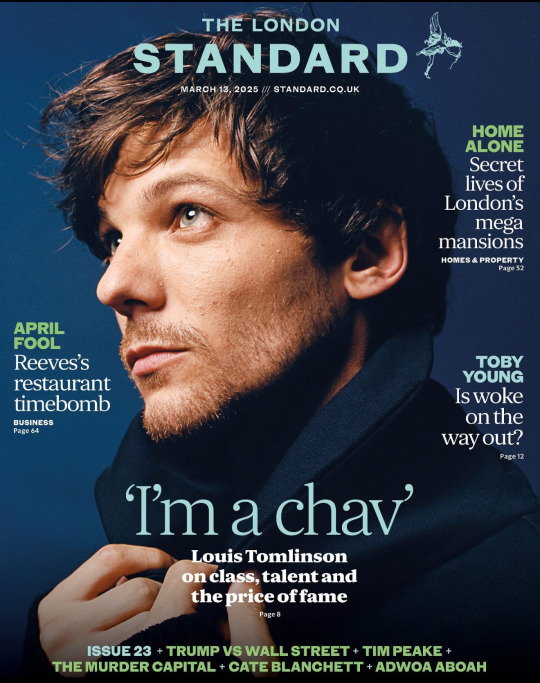
First, Larries tend to colludes how Louis is portrayed in the article with how Louis WANTS to be portrayed. “Louis didn't do himself any favors in that interview,” according to a popular post (not picking a fight with OP, citing as an example).
The reason that all Louis UAs quoted only Joe Bromley’s quotes is because the journalist had very intentionally painted Louis as a low-class, alcoholic (he made sure to describe biological dad Austin Troy as one), sloppy, out-of-control, crass person, showing Bromley’s classism and xenophobia while he was at it:
“Inside, as a cocktail bar, make-shift band set-up and rails of clothes made in China are being frantically erected, the security is flustered and tweens outside squawk and slam on the windows. I find Tomlinson, 33, hiding in the basement alongside a crate of warm Peroni beers, two bottles of Grey Goose vodka and a basket filled with Skittles and crisps. Hardly the red carpet treatment.”
“While Tomlinson appears somewhat erratic, his hand constantly gripped to one of the green bottles, he is effusively energetic with a singing Northern twang…”
Coincidentally, a year ago the out Bromley wrote an article on Harry titled, “Why Harry Styles is definitely a gay icon (even if you think he’s queerbaiting.”
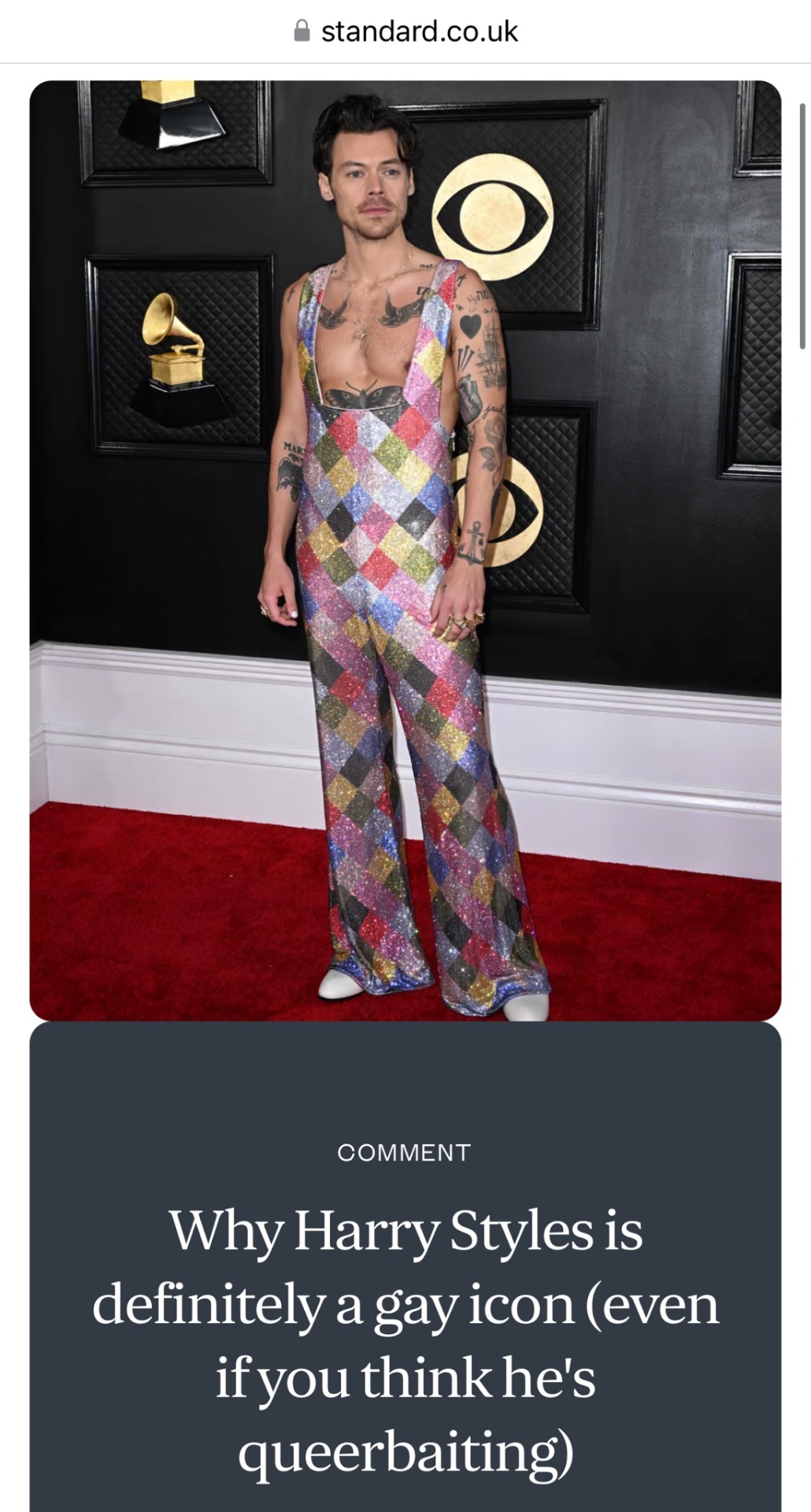
Bromley’s take? It’s better to queerbait an LGBT audience than to negotiate any other way of closeting, including admitting to being a chav.
Which is … basically the argument of Larries.
“Better to be performative than not.”
Bromley shows a bias that’s very unfortunate in fashion journalism— he has pre-judged the designer, instead of judging the clothes. You could count the descriptions of the clothes in the article in three or four sentences, starting with, “rails of clothes made in China.”
Okay? What is Bromley’s proof that English-made clothes are better?
My argument is that Larries have interpreted this portrayal of Louis as something Louis (or his team) would want to promote to the public. What for? As part of some “fuckboy,” “antihero,” “I hate posh” agenda? This is a man who routinely pays for his crew to stay at five-star hotels — Four Seasons, etc. — and to fly business class back to England— when they tour. He appreciates luxury and he shares. We all know this.
Louis’ quotes in the article were consistent with how he has always been. He is kind, loving, and generous to fans. He doesn’t take his fame too seriously. He is humble (too humble) about his creative instincts. He owns the chav persona that Sony thrust onto him and is proud of his roots. The journalist’s gross biases are not a “marketing strategy,” and not something promoted by Louis’ team, as evidenced by the fact that Helen Seamons unfollowed him on Instagram.
Second, it bothers me ENORMOUSLY when Larries call Louis a “liar,” specifically that word, that he “lies.”
“Lie” has value judgment that “PR” or “marketing” doesn’t. Why do Larries usually say Louis lies? Because he says he is a dad. That is 100% the primary reason. Because Louis’ being a dad rocks the foundation of Larrie ideology.
To the majority of Larries, Harry’s reported exploits with women, his unreleased song about getting a partner to have an abortion (High Tide) and about young girls tempting men and then getting pregnant (Kiwi) are all “forced” upon him, but Louis Tomlinson “lies” to them… because he wants to take responsibility for a child.
To Larries, what Harry does is “contractual marketing,” but Louis is “intentionally lying” because he wants to be seen as a fuckboy and get male fans.
Even if both of them are doing it for marketing reasons (and even if these reasons are BAD, selfish, ill-conceived), the fandom’s value judgments are different towards them.
Let’s say Louis really isn’t a dad, but he’s burdened with the same closet as Harry. Whose marketing comes off as more fuckboy? The guy who “dates” >20 women, who slept his way into a major movie role, who broke up a family with young children, who can’t keep a relationship for more than a couple of years, who won’t defend any partner publicly, who won’t speak up even when Louis is angry about Larry fanfiction being used in an HBO show by Harry’s friend? Or the guy who has had a relationship with the same girl for ten years, and publicly says he wants to be a good dad?
Why judge one but be sympathetic to the other?
Not one Larries will ever accuse Harry of “lying.” They will not dare being called a “rad” and being ostracized from the cult. They will circle the wagons, because they all know they can abuse Louis and their friends will nod along, because they know no one will drop them from their group chat, because they know Louis has no defenders in industry anyway; they feel they have power and control over him.
None of us know what Louis’ life has been like in reality, to deal with a divided and toxic fandom, to negotiate the image that he has and to continue to create authentic and honest songs, and to be responsible for other human beings in his family. Of course I disagree with some of his choices, but to see support for so much criticism toward Louis based on a grossly biased, manipulative article is really, really unfair.
#louis tomlinson#my thoughts#Joe Bromley#evening standard#harry styles#one direction#larry stylinson#Larries
33 notes
·
View notes
Text
Offseason Thoughts!!
ok i know a lot of people are dreading this offseason because it’s going to be Long it’s going to be Dramatic, but honestly i’m so here for it. like lowkey i love this time of year because really it’s the time for completely unbridled optimism in a lot of ways. if we do A, B, and C, who’s to say that that doesn’t fix the team and we win the super bowl next year? you literally can’t know for sure that it WON’T work!! (i didn’t say it was a time for realism, i said optimism, perhaps delusionally so 🥲)
plus i’m just genuinely interested in all the roster building stuff. figuring out contracts and how those might work, free agency, the draft and everything that those things entail - love it! all about it! so if you’re a sicko like me who IS into all of this (and i completely understand if you aren’t because it WILL be exhausting) i thought i’d make a little overview about the things we’ll be dealing with over the next several months.
Here is a list of all the internal free agents we are going to have to make decisions on, along with their expected cost and the likelihood of us keeping them

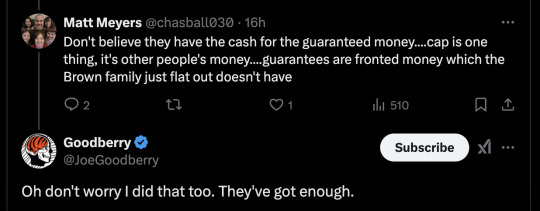
^Here is our expected cap space for the next few years (taking into account expected cuts like Rankins, Hubbard, and Cappa) plus some extra commentary.
as you can see, we have MORE than enough cash and cap space to be very aggressive this offseason. will we be? it’s certainly not in our reputation to do so, but they HAVE been making baby steps over the last few years to catch up to the modern nfl. the most recent example of which is firing coaches like lou before their contracts are up! very uncharacteristic of the brown family. and i think this reflects rumblings you hear on twitter that the organization is frankly embarrassed at how this season went (rightfully so). so i think you can expect they will do SOME things to reflect this urgency, even if it’s not as much as we’d like them to do.
the biggest decisions to be made: what do we do about tee?? what do we do about trey?? and then of course extending ja’marr, which i don’t think is a decision at all for anyone, but they’ve gotta decide how to do it to make both sides as happy as possible, when they struggled with that right up to the first game last season 😭
Tee: obviously if you’ve been following this blog you know i want to keep tee. i think we can pull it off and i think it will be beneficial to the team long term. but there is an argument to be made regarding his durability/injuries and whether the resources we’d spend on him would be better spent elsewhere like on fixing our historically bad defense. however, to that i say that we’re actually already one of the biggest spenders in terms of cap space on defense, and it didn’t help at all lmao. once we get rid of people like sheldon rankins and sam hubbard, who are definitely no longer worth the value of their contracts, we will free up a significant portion of the cap and use it to find better value free agents that can help us. the strategy going from overpaying for bad players to paying average amounts for average players. because with a top 5 offense like we had this year, we truly only need an average defense, unlike the HISTORICALLY bad one we had this year!
(now a caveat to this is if the bengals would actually show they’re willing to go all out and spend BIG on the BEST defensive free agents, then perhaps that’s worth more than keeping tee. but the only thing with that is that i just don’t believe the bengals would do it either way. even in 21 when we fixed our whole defense with free agency, we still did it by acquiring a bunch of smaller name value free agents, who ended up performing far above what the market thought they would. and i imagine that will be the strategy by the FO whether we keep tee or not.)
you can also say that a large part of our FO’s failure the last few seasons has been that we aren’t keeping our Known Talents. we drafted and developed jessie bates into a star, and then we let him go because we thought we could easily replace his value for cheaper in FA and the draft….and three years later safety is still a huge hole on our roster. DJ Reader is another example of a key player for our team that we thought we could replace and we failed dramatically. looking at tee, who is the replacement we have in line? jermaine?? for SO MANY reasons that is no longer a viable plan lmao. Someone in FA? this is a weak FA class. so we’d let tee walk and then probably end up overpaying for a lesser talent? what’s the point of that? okay maybe we draft a WR high to replace tee? well i’m hearing that it’s also not a great WR draft. and to expect a first year rookie to come in and offer even half of what tee does is also not a super sound strategy! (not to mention we’d have to spend a high draft pick that should probably be used on defense!)
tag tee? maybe! but i don’t think it’s as likely as extending him at this point. the second tag will be expensive (i think over 25k? maybe 26k) and that takes up a big chunk of our cap space if that’s what we’re worried about. plus it will piss off tee, to be tagged twice and not given the benefit of being able to get a long term deal? with his injury history especially? players hate that shit. i think it’s more beneficial for both parties to just do an extension at that point if we want to keep him. you can spread the cap hit out easier for the team, and tee won’t have to worry about his long term security as much.
ANYWAY this got long, honestly tee should have just been his own post lmao. but this situation is deifnitely the most interesting to me and seeing how it goes will be FASCINATING.
Trey: he requested a trade last offseason because he knows that his current contract is significantly less than he deserves for the value he offers (and that was BEFORE he got first team all pro and led the entire nfl in sacks this season, oh god 🥲) we have him under contract, but would he be willing to play under it? or would he retire like he threatened to? i’m honestly not sure, and i hope it doesn’t come to us finding out. we need to keep our star players happy, which means we need to figure something out here. do we extend him? he just turned 30, which the FO always frowns upon when it comes to extensions lol BUT he also just had his best year? i don’t think even our idiotic FO could say that just because his age starts with a 3 now means he’ll be washed next season or even the season after. what i’m seeing on twitter is that he’s expected to get at least one more deal of 2-3 years. and looking at the age of elite edge guys in the league, i think that that’s fair! and if you ask me, completely and totally worth it to keep trey. i mean jesus, who do we even have on defense if we lose him?? i think this one is a no-brainer, we’ve gotta offer him an extension for more money and i think he’d still be willing to take a reasonable deal to stay.
Ja’Marr: oh my god. i’m still filled with SO MUCH RAGE when i think back to how CLOSE we were to getting him signed last offseason. we were RIGHT THERE. all the rumors were saying it was basically a done deal!! all the numbers and years were agreed upon!!! but our cheap-ass FO couldn’t just get over themselves and structure the guarantees to match how most deals are done in the rest of the league!! they showed they’re willing to do a modern structure for Joe, they need to show they’re willing to do it with the rest of our stars. especially our first team all pro triple crown winning stars!! jesus christ!!!
the only thing that offers me some comfort is that ja’marr is still on the same path, contract-wise, as Justin Jefferson. they also couldn’t get over the hump before his fourth year even when both parties wanted to, and he ended up signing a massive contract in june the next year. i’m hoping that we can accomplish the same on a similar timeline because oh my god i do not need all the drama of ja’marr missing training camp again! and when you look at all the other WRs up for an extension this offseason (garrett wilson probably the only one who even comes slightly close to ja’marr’s level), i think it’s fair to say that ja’marr is setting the market whenever he signs. then like with justin’s last year, the other WRs will all sign slightly below. so i’m hoping hoping hoping that there’s no motivation on either side to drag this out. but of course, we’ll see!!
and then we’ve gotta think about the lesser free agents like Mike G, Mike H, BJ, Germaine…i have no idea what we do with them. i’d like to retain Mike G…..the three defensive vets i dunno! they’re good locker room leaders…mostly? they’re still solid if not losing a step. should we bring them back for reasonable vet deals? probably?? can we find better value in FA?? i’m honestly not sure. like you don’t want to lose these guys but it’s also hard to say that we should keep them at all costs when you look at the defensive performance last year. i just don’t know here. i’d hope we keep at least one of them? BJ maybe being the most important in my eyes?
there’s so much more to talk about honestly but i’ll stop yapping for now! what do you guys think we should do?? i’d love to hear your thoughts!
#fair warning this is mostly yapping about tee and all the possible things that could happen with him#and i didn't even mENTION the most important thing probably#being that joe has repeatedly explicitly and publicly demanded the FO to sign him#so like. they should NOT want to risk pissing off their star franchise QB!!#the rest of it...man i dunno.#i might make some polls lol?? see what the rest of you guys are thinking about some of these free agents#god this is long i'll be shocked if anyone reads the whole thing but i just wanted to organize my thoughts going into the offseason#who cares about the playoffs we've gotta figure out trey's contract structure!!!#cincinnati bengals
29 notes
·
View notes
Note
Hey Gina, I've noticed that more people, larries and some harries, tend to feel like everything he does seems calculated, and overall, he comes off as a bit less genuine. But when it comes to Louis, people seem to empathize with him more and justify the decisions he makes about his public image.
Why do you think that is?
That’s a huge, complex topic, love. I don’t think I can really sum it up in a quick way. And whatever I say, people are going to disagree and argue about it. But I’m an idiot and always have an opinion, so…
Some of it has to do with the way a lot of people can relate to the struggles Louis has had, and it makes them feel close to him. He’s an underdog and it feels good to root for an underdog. Some of it is that he comes across as very open and approachable and makes fans feel like their support makes all the difference in him being able to have a career (which, in many ways, it does). He also heavily plays into his “Everyman” and “man of the people” roles (not to say it’s fake, but it’s a strategy), and a lot of people feel that because he’s making his music and himself very accessible, that means he’s a better person who really cares about his fans vs someone like Harry whose tour tickets, for example, are extremely expensive. As I’ve said before, Louis’ persona and promo for his art is a strategy to achieve maximum return. But, because it’s accessible and down to earth, and because he talks a lot about hating phoniness and “Hollywood” types, etc. people seem to think none of what he says and does is PR or marketing. IMO, that’s crazy. That would mean he’s just winging his entire career. Strategy doesn’t have to mean fake. And calculated doesn’t have to mean phony. Calculated actually means making decisions based on careful examination of a situation. One would hope he’s doing that.
As for Harry, I think some of it is that his brand has been positioned as more aspirational, IMO, and for some reason some people get really worked up over that and have decided he’s elitist, fake, a poser, out of touch, etc. Additionally, he has withdrawn a lot from social media for the sale of his mental health and, thus, interacts less with fans when he’s not on stage or doing promo. People read that as not caring about his fans, being a snob, only caring about money and selling things, etc. I see it more as him wanting his music to speak for him. I think he’s trying not to give so much of himself away anymore, and I don’t think it’s as easy for him to play a role outside of performing. My guess is that if he had the choice, he’d drop music like Beyoncé does—no promo, just release the album, go on tour. But I don’t think that has anything to do with not caring about fans or only caring about making money. I just think that’s what fits his personality and his vision for his art.
Obviously, none of this is a complete answer. It’s a very surface level of reading the situation based off of what I see in my dash and in my inbox.
32 notes
·
View notes
Text
“Becoming Led Zeppelin”
(With a little Python thrown in)
(As well as a tiny bit of astrology)
Because I absolutely hate scrolling through long posts, I try never to inflict them on others. So, for the meat and potatoes, keep reading. (Possible spoilers ahead. It’s also pretty personal.)
I went with my son (age 32), who knows all the names of the band members and who played what instruments, and is well acquainted with their catalog - and that’s where it stops. On the other hand, I (age 66) know all that, plus have all their birthdays written in my planner, and know what “Obbs’ Tweedle” was. So I thought it would be interesting to compare takes on the movie.
Dinner first - we talked a bit about Monty Python - how I had been absolutely the right age for it when PBS started broadcasting the show, but since I grew up way out in the country - rural Michigan; down the road from a pig farm, even - there was no cable TV and I was denied the chance to watch. But now, as I finally commence my dotage, I am slowly watching all the episodes via YouTube. (I know I saw “Holy Grail,” in college, in the late 1970s, but I was extremely wasted at the time - weed was only a $5 fine in Ann Arbor then - and, to this day, I remember only the rabbit part and a little bit of Sir Robin. I really want to see it sober, but not on my phone.)
Anyway, off to the movie theater. There eventually were a couple dozen people there altogether - we had great seats (I thought), and when the lights finally went down we were ready to be delighted.
Every woman there cooed audibly any time a band member’s baby/boyhood picture was on the screen.
The filmmakers had the sense and good taste to let the live performances play through without voiceovers “explaining” things. We enjoyed those parts the most, of course.
We were astounded by how good they sounded after only one month of playing together. Although, as Son pointed out, “They’re all very good musicians, too.”
Jimmy can yammer all he wants about having a vision and making it happen, but I don’t think it’s possible in this day and age for a repeat, at least not any time soon - the stars were aligned just so when this all was going down. And there wasn’t such an overemphasis on marketability back then.
I was actually alive for all of that! In 5th and 6th grade. Every date they showed, I had a memory. “Oh, that’s when Jim (my big brother) came home from Vietnam,” for example.
The boys were all so reverent and touched when they listened to the Bonzo interview parts. There was zero interaction between the surviving members, though, no sense of connection - they all were interviewed separately (I want to tour their homes!) - I can’t help but remember the ongoing Page-Plant feuding, as well as Page and Plant not remembering Jonesy’s phone number back in the 1990s….
Son and I were very charmed by and impressed with Jonesy, who came across as very humble and chill.
The sound was more than loud enough to cover all my various eeps and whimpers, and there were lots of eeps and whimpers. Drooling, too. Though at least half the time it was the music (at optimum volume) getting me off, and not Jimmy hiding behind his hair.
We agreed the movie was much too short (at just over 2 hours). Where can we put in our requests for them to keep going with this?!?
Both of us loved the film, and both of us would love to see it again. (Although as stated in an earlier post, I would like to go with other like-minded women, and have pitchers of margaritas instead of a bottle of Dasani.)
The astrology part:
I think they need to put Jimmy Page’s picture next to “Capricorn” in the dictionary. He had the vision of knowing exactly what he wanted to do, and where he wanted to go - he had all the knowledge, and all the skills, and all the patience, and all the strategies, he needed to get there - a very structured, architectural approach to realizing his long-term vision - he was in command all the way. Jonesy and Robert and Bonzo had important parts to play, but it was Jimmy’s baby.
Robert spoke frequently of just wanting to sing - he’s a Leo! That desire to perform.
Jonesy speaking so often of his dad’s influence - that’s a Capricorn thing, too.
25 notes
·
View notes
Text
The impoverished imagination of neoliberal climate “solutions

This morning (Oct 31) at 10hPT, the Internet Archive is livestreaming my presentation on my recent book, The Internet Con.

There is only one planet in the known universe capable of sustaining human life, and it is rapidly becoming uninhabitable by humans. Clearly, this warrants bold action – but which bold action should we take?
After half a century of denial and disinformation, the business lobby has seemingly found climate religion and has joined the choir, but they have their own unique hymn: this crisis is so dire, they say, that we don't have the luxury of choosing between different ways of addressing the emergency. We have to do "all of the above" – every possible solution must be tried.
In his new book Dark PR, Grant Ennis explains that this "all of the above" strategy doesn't represent a change of heart by big business. Rather, it's part of the denial playbook that's been used to sell tobacco-cancer doubt and climate disinformation:
https://darajapress.com/publication/dark-pr-how-corporate-disinformation-harms-our-health-and-the-environment
The point of "all of the above" isn't muscular, immediate action – rather, it's a delaying tactic that creates space for "solutions" that won't work, but will generate profits. Think of how the tobacco industry used "all of the above" to sell "light" cigarettes, snuff, snus, and vaping – and delay tobacco bans, sin taxes, and business-euthanizing litigation. Today, the same playbook is used to sell EVs as an answer to the destructive legacy of the personal automobile – to the exclusion of mass transit, bikes, and 15-minute cities:
https://thewaroncars.org/2023/10/24/113-dark-pr-with-grant-ennis/
As the tobacco and car examples show, "all of the above" is never really all of the above. Pursuing "light" cigarettes to reduce cancer is incompatible with simply banning tobacco; giving everyone a personal EV is incompatible with remaking our cities for transit, cycling and walking.
When it comes to the climate emergency, "all of the above" means trying "market-based" solutions to the exclusion of directly regulating emissions, despite the poor performance of these "solutions."
The big one here is carbon offsets, which allows companies to make money by promising not to emit carbon that they would otherwise emit. The idea here is that creating a new asset class will unleash the incredible creativity of markets by harnessing the greed of elite sociopaths to the project of decarbonization, rather of the prudence of democratically accountable lawmakers.
Carbon offsets have not worked: they have been plagued by absolutely foreseeable problems that have not lessened, despite repeated attempts to mitigate them.
For starters, carbon offsets are a classic market for lemons. The cheapest way to make a carbon offset is to promise not to emit carbon you were never going to emit anyway, as when fake charities like the Nature Conservancy make millions by promising not to log forests that can't be logged because they are wildlife preserves:
https://pluralistic.net/2022/03/18/greshams-carbon-law/#papal-indulgences
Then there's the problem of monitoring carbon offsetting activity. Like, what happens when the forest you promise not to log burns down? If you're a carbon trader, the answer is "nothing." That burned-down forest can still be sold as if it were sequestering carbon, rather than venting it to the atmosphere in an out-of-control blaze:
https://pluralistic.net/2021/07/26/aggregate-demand/#murder-offsets
When you bought a plane ticket and ticked the "offset the carbon on my flight" box and paid an extra $10, I bet you thought that you were contributing to a market that incentivized a reduction in discretionary, socially useless carbon-intensive activity. But without those carbon offsets, SUVs would have all but disappeared from American roads. Carbon offsets for Tesla cars generated billions in carbon offsets for Elon Musk, and allowed SUVs to escape regulations that would otherwise have seen them pulled from the market:
https://pluralistic.net/2021/11/24/no-puedo-pagar-no-pagara/#Rat
What's more, Tesla figured out how to get double the offsets they were entitled to by pretending that they had a working battery-swap technology. This directly translated to even more SUVs on the road:
https://en.wikipedia.org/wiki/Criticism_of_Tesla,_Inc.#Misuse_of_government_subsidies
Harnessing the profit motive to the planet's survivability might sound like a good idea, but it assumes that corporations can self-regulate their way to a better climate future. They cannot. Think of how Canada's logging industry was allowed to clearcut old-growth forests and replace them with "pines in lines" – evenly spaced, highly flammable, commercially useful tree-farms that now turn into raging forest fires every year:
https://pluralistic.net/2023/09/16/murder-offsets/#pulped-and-papered
The idea of "market-based" climate solutions is that certain harmful conduct should be disincentivized through taxes, rather than banned. This makes carbon offsets into a kind of modern Papal indulgence, which let you continue to sin, for a price. As the outstanding short video Murder Offsets so ably demonstrates, this is an inadequate, unserious and immoral response to the urgency of the issue:
https://pluralistic.net/2021/04/14/for-sale-green-indulgences/#killer-analogy
Offsets and other market-based climate measures aren't "all of the above" – they exclude other measures that have better track-records and lower costs, because those measures cut against the interests of the business lobby. Writing for the Law and Political Economy Project, Yale Law's Douglas Kysar gives some pointed examples:
https://lpeproject.org/blog/climate-change-and-the-neoliberal-imagination/
For example: carbon offsets rely on a notion called "contrafactual carbon," this being the imaginary carbon that might be omitted by a company if it wasn't participating in offsets. The number of credits a company gets is determined by the difference between its contrafactual emissions and its actual emissions.
But the "contrafactual" here comes from a business-as-usual world, one where the only limit on carbon emissions comes from corporate executives' voluntary actions – and not from regulation, direct action, or other limits on corporate conduct.
Kysar asks us to imagine a contrafactual that depends on "carbon upsets," rather than offsets – one where the limits on carbon come from "lawsuits, referenda, protests, boycotts, civil disobedience":
https://www.theguardian.com/commentisfree/cif-green/2010/aug/29/carbon-upsets-offsets-cap-and-trade
If we're really committed to "all of the above" as baseline for calculating offsets, why not imagine a carbon world grounded in foreseeable, evidence-based reality, like the situation in Louisiana, where a planned petrochemical plant was canceled after a lawsuit over its 13.6m tons of annual carbon emissions?
https://earthjustice.org/press/2022/louisiana-court-vacates-air-permits-for-formosas-massive-petrochemical-complex-in-cancer-alley
Rather than a tradeable market in carbon offsets, we could harness the market to reward upsets. If your group wins a lawsuit that prevents 13.6m tons of carbon emissions every year, it will get 13.6 million credits for every year that plant would have run. That would certainly drive the commercial imaginations of many otherwise disinterested parties to find carbon-reduction measures. If we're going to revive dubious medieval practices like indulgences, why not champerty, too?
https://en.wikipedia.org/wiki/Champerty_and_maintenance
That is, if every path to a survivable planet must run through Goldman-Sachs, why not turn their devious minds to figuring out ways to make billions in tradeable credits by suing the pants off oil companies?
There are any number of measures that rise to the flimsy standards of evidence in support of offsets. Like, we're giving away $85/ton in free public money for carbon capture technologies, despite the lack of any credible path to these making a serious dent in the climate situation:
https://www.spglobal.com/commodityinsights/en/market-insights/latest-news/energy-transition/072523-ira-turbocharged-carbon-capture-tax-credit-but-challenges-persist-experts
If we're willing to fund untested longshots like carbon capture, why not measures that have far better track-records? For example, there's a pretty solid correlation between the presence of women in legislatures and on corporate boards and overall reductions in carbon. I'm the last person to suggest that the problems of capitalism can be replaced by replacing half of the old white men who run the world with women, PoCs and queers – but if we're willing to hand billions to ferkakte scheme like carbon capture, why not subsidize companies that pack their boards with women, or provide campaign subsidies to women running for office? It's quite a longshot (putting Liz Truss or Marjorie Taylor-Greene on your board or in your legislature is no way to save the planet), but it's got a better evidentiary basis than carbon capture.
There's also good evidence that correlates inequality with carbon emissions, though the causal relationship is unclear. Maybe inequality lets the wealthy control policy outcomes and tilt them towards permitting high-emission/high-profit activities. Maybe inequality reduces the social cohesion needed to make decarbonization work. Maybe inequality makes it harder for green tech to find customers. Maybe inequality leads to rich people chasing status-enhancing goods (think: private jet rides) that are extremely carbon-intensive.
Whatever the reason, there's a pretty good case that radical wealth redistribution would speed up decarbonization – any "all of the above" strategy should certainly consider this one.
Kysar's written a paper on this, entitled "Ways Not to Think About Climate Change":
https://political-theory.org/resources/Documents/Kysar.Ways%20Not%20to%20Think%20About%20Climate%20Change.pdf
It's been accepted for the upcoming American Society for Political and Legal Philosophy conference on climate change:
https://political-theory.org/13257256
It's quite a bracing read! The next time someone tells you we should hand Elon Musk billions to in exchange for making it possible to legally manufacture vast fleets of SUVs because we need to try "all of the above," send them a copy of this paper.

If you'd like an essay-formatted version of this post to read or share, here's a link to it on pluralistic.net, my surveillance-free, ad-free, tracker-free blog:
https://pluralistic.net/2023/10/31/carbon-upsets/#big-tradeoff
#pluralistic#neoliberalism#climate#market worship#economics#economism#there is no alternative#carbon credits#climate emergency#contrafactual carbon#carbon upsets#apologetics#murder offsets#indulgences
232 notes
·
View notes
Text
Why Influencers Won’t Make A Lasting Fortune | 💰💰💰
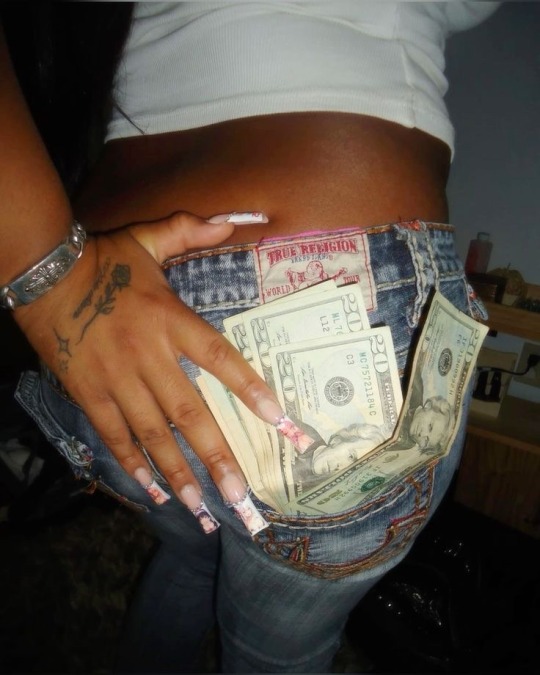
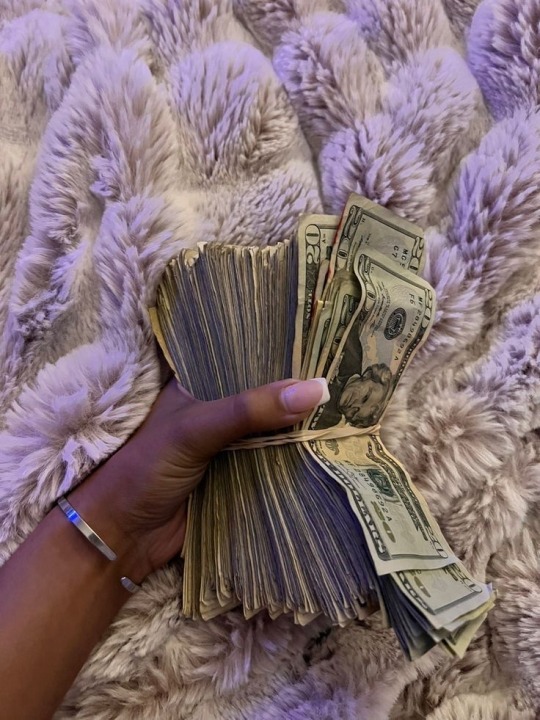

Let’s be honest—being an influencer looks like the dream. Free stuff, brand deals, followers hyping you up, and money just for posting a cute pic or trendy video. But here’s the thing that nobody talks about enough: influencing isn’t built to last.
Don’t get me wrong—some influencers are making big money right now. But if we’re talking about long-term, generational wealth? I have a strong belief that most of them won’t get there. Here’s why
1. Trends Fade. Fast.
The internet moves at lightning speed. What’s trending this week? Forgotten next week. Whether it’s dance challenges, aesthetics, or audio clips, things go viral and die out just as quick. That’s the whole point in a trend, it’s momentarily.
If your whole income depends on staying relevant and trendy, then you’re basically building your future on shaky ground. The second your content stops hitting, the money slows down too. You’d have to constantly chase trends which sometimes can result in you having to change your aesthetic or niche, which then results in having to bring in a whole new audience.
2. They Don’t Own Anything
Let’s not forget—Instagram, TikTok, YouTube… none of these platforms belong to the influencer. One algorithm switch, one random suspension, and boom—your visibility and income are gone. Just like that.
It’s risky to build your entire career on a platform you don’t own or control. You’re literally playing by someone else’s rules. Remember when TikTok shut down for a day and all the influencers had a meltdown, some of them moved to instagram or blue or X, they had to find a new platform to continue working but think about it, what if there was no other alternative…then what happens?
3. Brand Deals Are Short-Term
Sure, brand deals pay well. But they’re not guaranteed. They come and go based on your numbers, engagement, and how “hot” you are in the moment.
That means your income isn’t steady—it’s based on how many brands want to work with you right now. And let’s be real, brands move on fast when you’re not the current It Girl.
4. It Doesn’t Scale
Influencing ties your income to you. Your time. Your energy. Your appearance. Your ability to keep showing up and performing online.
There’s only so much of you to go around, and there’s only so long you’ll be able (or willing) to keep up the grind. If you stop posting, you stop earning.
5. No Real Assets
Unless an influencer turns their platform into a business—think products, services, investments, or digital assets—they’re not building anything that can survive without them.
Attention fades. And when it does? If there’s nothing solid behind all the hype, there’s nothing left to profit from.
So What’s The Move?
If influencers want to really build wealth, they have to stop treating influence like the end goal. It’s just a springboard. Use the attention to launch something bigger—like a brand, an online business, a product line, a faceless digital asset—something that can outlive the trends.
For example, a few influencers who utilised their fame instead of surviving off it. Look at Huda Kattan: she didn’t rely on clout, she built Huda Beauty, which she fully owns. Emma Chamberlain used her online fame to push Chamberlain Coffee and her podcast, barely even posting anymore unless it’s to market her businesses. Charli D’Amelio branched into TV, she appeared on Dancing With The Stars; Addison Rae moved into acting, music, and film; Jackie Aina started her own luxury candle line.
You’ll notice a lot of viral names start to fade from your feed—but that doesn’t mean they’ve fallen off. It means they took their attention and turned it into something real. They’re building wealth off-screen, and that’s the real flex. Because pretty posts and paid ads are cute for now, but real wealth? That’s about ownership, strategy, and building something that lasts after the spotlight fades.
Read Why I Would Choose Faceless Digital Marketing Over Becoming An Influencer
Start monetising your pinterest, through paid ad, affiliates and more : click here
Grow your pinterest account to a million monthly views in less than 6 months and get it ready for digital marketing : click here
#influencers#tiktok#instagram#twitter#passive income#online income#how to earn money#earn money online#make money online#money#not my pic
11 notes
·
View notes
Text
McDonald’s Lacanian approach allows him to see some internal dynamics of the nudge that otherwise would not be as evident. (I will spare you the Lacan and give you the pay-off.) First, he notes that nudges never live up to their promise of seamless unconscious manipulation of behavior. Instead, they always announce themselves more or less clearly, spurring the subject to begin questioning what the nudger wants from them — and possibly rebelling against the intended outcome simply out of annoyance at the attempted manipulation. For this reason, nudges generally don’t work, and presumably the nudgers know they don’t work. Hence McDonald concludes that nudges are not actually directed at the ostensible nudgees, but are messages sent to some presumed third party. For example, the attempts to “incentivize” a return to work post-covid by removing unemployment benefits had not apparent impact on employment — but they were a powerful message that everyone should get back to work and no longer expect any mollycoddling (my term, not McDonald’s). Finally, the nudge paradigm as a whole sends a broader message of despair, signalling clearly that any deliberate collective project is impossible. This opens up a performative contradiction, because on the one hand, only the market can be trusted to deliver any social benefit, but on the other hand, the market is apparently not achieving that on its own and needs tinkering by expert state actors. Applying these to Trump’s “shoves” — his attempts to use economic inducements to blackmail people into his desired behavior — I think we get further evidence that Trump is a heretical mutation of the neoliberal project. First of all, like a classic nudge, Trump’s “shoves” generate a lot of questions as to what he really wants, but in contrast to the neoliberal apparatchik, Trump’s desire is fundamentally unknowable — apparently even to himself. Hence investors and political commentators all assumed, up to the weekend before they were set to take effect, that Trump would call off his harsh tariffs against Canada and Mexico. And at the last minute he did, at least temporarily, after securing concessions that most observers agree were already happening (and, bizarrely, conceding to Claudia Sheinbaum’s demand that he take more action to stop the flow of guns into Mexico). Will he find another excuse to kick the can down the road in early March? Presumably, but who knows? What is at stake here is more than simple incoherence or inconsistency — and we are certainly not dealing with some game of 11-dimensional chess where Trump is skillfully deploying Nixon’s “madman strategy.” Where the nudger ostensibly sought to influence the behavior of the nudgee for the sake of some particular end, Trump’s shoves seem to be nothing but the assertion of dominance and control for its own sake. And we can see that the same ambition was present in the original nudge paradigm, which promised a form of seamless social control without political conflict. Surely what made nudging so appealing to people like Barack Obama was not the series of piecemeal social gains they could deliver (increasing uptake of 401(k)’s by 6%!) but the very idea that “smart” policymakers could gently guide society from behind the scenes without indulging in anything so vulgar as political contestation.
18 notes
·
View notes
Text
By: Eric W. Dolan
Published: Jan 3, 2022
Cognitive performance is slightly reduced among those with higher levels of celebrity worship, according to a new study published in BMC Psychology.
“Interest in the topic of celebrity worshipers spans almost two decades. From several studies, over that period, research showed a weak to moderate tendency for those who showed the strongest admiration for their favorite celebrity to have lower cognitive skills, using a variety of cognitive measures,” explained study authors Lynn E. McCutcheon, Ágnes Zsila, and Zsolt Demetrovics in a joint statement to PsyPost.
“However, most of these studies did not control for a variety of extraneous variables. The current study did control for several possibly relevant variables.”
In the study, 1,763 Hungarian adults completed a 30-word vocabulary test and a digit symbol substitution test, a validated assessment of fluid intelligence. The researchers also collected data about the participants’ self-esteem, current family income, material wealth, and highest level of education.
Celebrity worship was measured using a scientific questionnaire known as the Celebrity Attitude Scale. The scale asks participants the extent to which they agree or disagree with statements such as “I often feel compelled to learn the personal habits of my favorite celebrity,” “I am obsessed by details of my favorite celebrity’s life,” and “If I were lucky enough to meet my favorite celebrity, and he/she asked me to do something illegal as a favor I would probably do it.”
Even after controlling for demographic and socioeconomic variables, the researchers found that high scores on the Celebrity Attitude Scale were associated with lower performance on the two cognitive ability tests.
“We found a weak tendency for those who showed the strongest admiration for their favorite celebrity to have lower cognitive skills, suggesting that the earlier results were not due just to chance,” the authors of the study said. “Our results also support previous findings showing that excessive behaviors such as celebrity worshiping can possibly impair cognitive functioning, presumably due to the increased focus and energy invested in this behavior that becomes dominant in the individual’s life.”
“Although celebrity admiration seems not to be a strong precursor of poorer cognitive performance, high levels of admiration can be regarded as one contributing factor to lowered performance in tasks requiring cognitive effort, independently from education or age.”
But it is unclear whether celebrity worship is the cause or consequence of reduced cognitive ability. For example, it “may be that individuals with higher levels of cognitive skills are more likely to understand the marketing strategies behind a famous person,” and thus less vulnerable to celebrity worship, the researchers explained. But it is also possible that celebrity worship functions like an addictive behavior and requires cognitive effort to be maintained.
Previous research has found that celebrity worship is associated with addictive and problematic social media use.
“Future studies should seek further support for our suggestion that the cognitive effort invested in maintaining the absorption in a favorite celebrity may interfere with the person’s performance in tasks that require attention and other cognitive skills,” the authors told PsyPost. “Although our research does not prove that developing a powerful obsession with one’s favorite celebrity causes one to score lower on cognitive tests, it suggests that it might be wise to carefully monitor feelings for one’s favorite celebrity, keeping in mind that most celebrities are human beings who have some flaws just like average persons have.”
The study, “Celebrity worship and cognitive skills revisited: applying Cattell’s two-factor theory of intelligence in a cross-sectional study“, was published November 8, 2021.
--
Abstract
Background
Almost two decades of research produced mixed findings on the relationship between celebrity worship and cognitive skills. Several studies demonstrated that cognitive performance slightly decreases with higher levels of celebrity worship, while other studies found no association between these constructs. This study has two aims: (1) to extend previous research on the association between celebrity worship and cognitive skills by applying the two-factor theory of intelligence by Cattell on a relatively large sample of Hungarian adults, and (2) to investigate the explanatory power of celebrity worship and other relevant variables in cognitive performance.
Methods
A cross-sectional study design was used. Applying an online survey, a total of 1763 Hungarian adults (66.42% male, Mage = 37.22 years, SD = 11.38) completed two intelligence subtests designed to measure ability in vocabulary (Vocabulary Test) and digit symbol (Short Digit Symbol Test). Participants also completed the Celebrity Attitude Scale and the Rosenberg Self-esteem Scale. Subjective material wealth, current family income and general sociodemographics were also reported by participants.
Results
Linear regression models indicated that celebrity worship was associated with lower performance on the cognitive tests even after controlling for demographic variables, material wealth and self-esteem, although the explanatory power was limited.
Conclusions
These findings suggest that there is a direct association between celebrity worship and poorer performance on the cognitive tests that cannot be accounted for by demographic and socioeconomic factors.
==
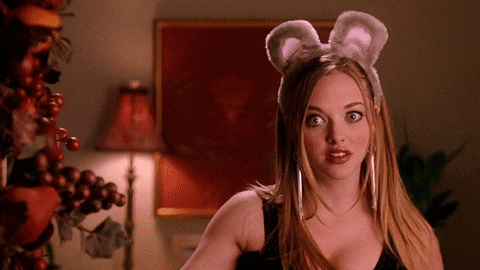
#Eric W. Dolan#psychology#human psychology#celebrity worship#celebrities#intelligence#religion is a mental illness
25 notes
·
View notes
Text
GOSSIP AND RUMORS LEAD FANS BAFFLED ; KNOCKED LOOSE AUDIENCE WANTS FORMAL APOLOGY?
Rumors about Bryan and Poppy. Jimmy Kimmel Apology, and the theory on music
This is solely for entertainment purposes only, if you have any theories and or questions about whats happening, feel free to comment down below
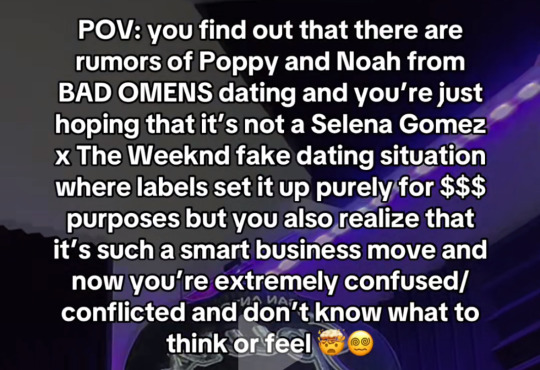
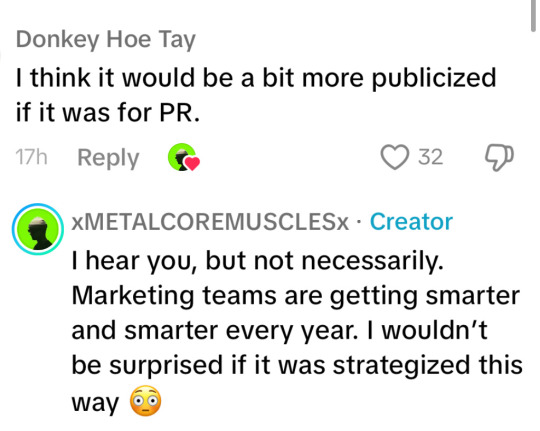
Hello! Welcome back to another tea rant.
Good morning! Good afternoon, and good evening!
Today it’s gonna be a little different than my usual routine.
We’re going to deep dive into this music industry, and how many artists today have marketing teams into getting fans to buy their music, albums, and much more.
And the tea about what’s been revolving around Jimmy Kimmel and the audience wanting a formal apology.
THE POPPY AND NOAH SITUATION
Of course, this long rant about people saying they’re “dating” or they’re not “dating” has been for a long while.
Ever since Noah asked Poppy about being in a collaboration, many fans speculate this duo is actually a thing.
Sounds like fans are getting confused.

What more grabbed my attention is the third user who had a very interesting theory.
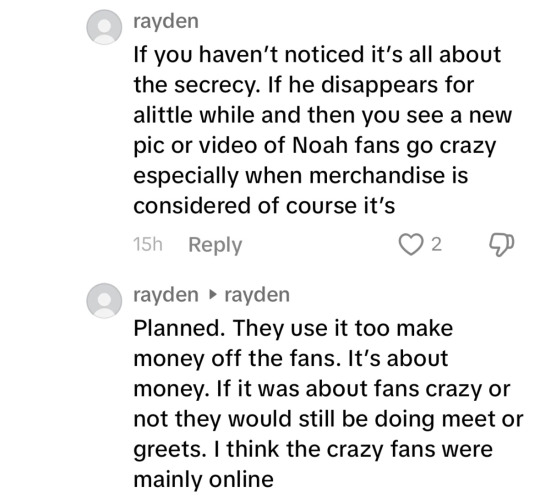
PLANNED IN SECRECY? A Theory
In their post, they state that Noah and the band disappear for awhile, and when they come back either to drop a new photograph of Noah, or him showing off new merch, it seems to be all planned out.
I don’t know where to start, so let’s start out with the basics, how does the business actually work?
This theory led me to think and process what companies really want. Which is money. I think I’m going to break it down bit by bit into categories. Since this user is being specific.
CATEGORY 1 : LABELS
This is label marketing. The term used for music label industries, in which they want to sell items and sell products for bands
Such as Linkin Park, BabyMetal, Metallica, Knocked Loose, Bad Omens, BTS, anyone that has some type of contract with different music industries.
Now labels, they get you anything in the business. It’s their way to market off of your money for them to sell you what you want.
It’s not a bad thing actually, it’s been happening for decades. So it’s pretty normal for companies to do this.
Category 2: ADVERTISING
In this category, once they have a good understanding and both parties agree to run an advertising strategy or product they usually put it out on social media.
They can advertise a band, making collaborations with a person to help them out and find new audiences.
It’s their own way to market off and get money from their consumers.
Like for example how they did with Poppy and Bad Omens.
Poppy signed the contract with Sumerian for her new album “Negative Spaces”
This led Sumerian find different ways to advertise her in many articles, being photographed with Noah, and being photographed with the group to promote one of their songs.
I’m telling you now, please do not come after Sumerian Records, this is just how they do things and business. It’s normal for companies to do things like this. It’s their job.
With advertising, since each label manager has an employee their financing from, it’s a lot more easy to have them produce songs.
Category 3 : MANAGERS AND PR TEAMS
So as you might have guessed, each front person, has an individual label manager or management and what they call assistants PR teams.
So what do they do?
In short terms, they are responsible for everything, just like the band is responsible for gaining profits.
1. Booking Gigs
2. Negotiate contracts
3. Promote
4. Arrange schedules
5. Broker deals
6. Financial management
7. Advising bands on career decisions
8. Band scheduling
9. Booking and scheduling
10. Securing record deals
11. Attending a bands performance
12. Artist development
13. Branding
14. Career Development
15. Encouraging and supporting their bands
16. Network with other band managers
17. Record label representation
18. Working as hard as the band
If you haven’t seen the movie “American Satan”
In terms it’s like that movie, where a band is wanting a career path into the music business.
So why have managers?
That’s easy to say.
A band can’t do it alone. They need an anchor to support them. In this case management. Management can bring a band together to promote them.
For example, since Bad Omens is the new band and the most popular, my guess is that they signed with Sumerian Records for their talent.
See each label looks for talent or in terms “make the scene”
There’s a lot to explain here, from what I mean by this statement is that record labels look for talented musicians who in their eyes can become very successful in the long run.
As for PR management, their job is to solely focus on making sure they get their band visibility on various platforms. Like social media.
They are also responsible for scheduling interviews, make sure the frontman or lead singer gets a highlight of their performance, make sure they advertise their music. They’re responsible for scheduling tours.
Category 4 : MONEY INCOME
So this leads us to this theory this user mentioned.
Bands just don’t announce a new album or new merchandise until they have or have been set on how much they’re going to sell.
If it’s behind the scenes then i say it sure is dealt with secretly.
Money is a distribution. A lot of it comes from on how many people want to become rich. It’s a huge product among the United States.
In this case we could think of it as the higher ups.
This distribution is normal. It’s used for marketing, it’s used in jobs, it’s used in your day to day lives.
Money nowadays gets us everywhere. It gets us our groceries, it gets us monthly or weekly payments due to working regular jobs and eight hour shifts.
Well in huge companies, like music industries money is a huge deal. It’s a way of making money from advertising and selling products.
But that’s all I know so far.
This brings the theory into if it is actually all planned out
PLANNED OUT IN SECRECY

The user above mentioned that it could potentially be planned out.
I mean planning out every little thing that the band agrees on doing could be possibly the next big thing.
If they want to profit off anything, they have the power to do so.
If Bad Omens doesn’t post for many days or weeks at a time, maybe they’re planning out something big.
But this also revolves around how many tour dates and schedules they have to attend. Now this is where it gets interesting because whether or not we know how this music industry works, it makes a good theory.
THEORY #1: The Band Profits off of what fans buy.
Bad Omens is a good example on this subject. It brought me back to what I delve down into the rabbit hole.
For instance, concerts.
In this particular case, from what I’ve heard from many people that surprised me was the way they profit money from selling tickets.
This can be a good tactic, especially if they want to get fans to buy tickets. It’s their way to make the fans happy by giving them the option to buy merch, buy vinyls, albums, and many more.
THEORY 2: THEY LURK
For instance, this is just an FYI we know that Noah doesn’t have socials, and deleted everything off the web.
Just like Matt Dierkes, Bryan, and Ryder, they have socials. But what do they use them for?
I think if Noah was aware of what is happening around social media, he might be the one behind the Bad Omens official social media.
Maybe, he sees everyone’s comments and posts. To where they might have seen every beef and every rant that each fan posted.
This leads to the theory they might be lurkers and peep at every little detail that comes right out of the social platform.
Maybe Ryder and Matt keep tabs on everything and monitor what fans want.
Could it just be coincidence or is it real?
In the past, we know Noah talked to fans and kept them in the loop for new music and new albums back in 2019.
But after he disappeared from social media, this leads to the theory that he is still on socials.
But we can’t know for sure.
This has lead to many deep fakes and fake Noah Sebastian accounts that led many people to believe they are talking to the real Noah.
If people say to you he’s a real person talking behind the screen, then it’s probably not the real Noah Sebastian. A lot of fans joke about it, but I think it’s just dumb trying to troll other fans that he’s real.
I think it’s highly annoying that this shit keeps happening.
So why do they lurk?
This brings back to the tea blogs on this app, that many people have conversations about. But since they’re just speculations, it’s not something to deeply worry about.
It’s completely normal for people who work with bands have social media. This is another way to get fans and get followers to interact with the band and their assistance.
Whether they lurk on social media, they have known about situations.
They look out for the good comments and bad ones.
This theory also applies to them planning things out for the long run and possibly plan ahead for the fans to enjoy.
This includes their merchandise on their official website, their albums, and more likely their music.
What the fans look for and what they want in specific items, etc.
A band isn’t just people playing drums, guitar, bass, and backing vocals and having a lead singer.
It is a business.
If we understand that what they look for is good then they’ll find a way to advertise it. Planning it out in secret.
I’m not against anyone but it sounds fairly smart for companies to do this.
MORE BUYS = MORE BUSINESS
quality over quantity.
MORE BUSINESS = MORE MONEY
So when it comes to their merchandise, they look for the best quality of products to sell. This includes them making them in a factory where they work with several artists and producers.
Since Bad Omens have been doing this for years, they’re the ones buying the most to get what the fans want.
This is where when they put out their merchandise, fans buy the items and Bad Omens profit from them.
Now that’s a good way to make business.
And no, they’re not using AI to produce these results.
People tend to manipulate others into thinking it is AI, just because they want to start drama.
In this case, they are definitely not using anything related to AI.
That’s why they have the best tattoo artist and comic book writer Davis Ryder.
I think a lot of people tend to forget that they have a tattoo artist in their band which is Nicholas Ruffilo and Davis Ryder, who is responsible for making these designs stand out than most.
I’m not too sure about Jolly. But he does play a role
This leads to Jolly being the second person to help Noah produce and co-write songs.
Jolly and Noah have been doing this for years. They wrote Dethrone together and the past two albums of their launching careers.
Nicholas has been with them since they first met.
Folio came afterwards after finding a good person to play drums.
So for anyone thinking it is AI, it’s not. These men have been doing business since the very beginning of their careers.
Noah knows a lot about this business, since he was a teen.
He grew up knowing his way around bands.
From starting out to play guitar in one of the bands he used to be a part of in Washington, to moving to Los Angeles.
THEORY 3: SUMERIAN RECORDS
So, this leads to theory 3 being Sumerian Records and how they navigate through the music business.

Like I said, Sumerian records is a huge company. They are responsible for everything and everyone.
This leads them to the list of supporting the band.
They navigate their way through social media and putting out what profits them.
I’m not saying it’s bad for them to advertise their band. It’s actually good for them.
This has the best opportunity for the band to get money from the fans and tours for them to entertain. After all it’s an entertainment industry.
If you have seen American Satan, then it plays a role into this theory.
Bands look for what they want for fans to enjoy music.
This led to Bad Omens to support Linkin Park on them starting a new tour. With them bringing Erra, for Anything > Human.
Sumerian Records does support Bad Omens. They’re not putting them aside. If they were putting them aside for not showing them support then it would be the complete opposite.
If you guys remember they are working on a new album and new merch. Just like they did the past few years. Starting from 2019 to current 2024.
CONFUSION ON FANS

So if there is a theory that Sumerian is just doing this for marketing reasons there’s no need to worry.
It’s all part of the process for bands to do this.
There’s been a lot of speculation about it.
But since this is all just rumors and people gossiping that they’re definitely doing this for marketing purposes, it’s basically normal.
It’s not illegal to do.
The good news on this is that they’re gaining more money just by selling items that the band produces and makes.
Making fans happy and making the metal industry entertaining.
But a lot of fans are simply confused if Poppy is actually a stunt artist, that Sumerian put in order for her album to sell.
I think it’s a way to say
CONSUMER BEFORE THE BUYER
By this I mean the company that profits most from a band is that the band themselves is a consumer for the company.
They work with bands, make music and if they hit a million streams on this specific song it goes out to the public before they start buying vinyls and merchandise.
This makes a lot of industries take action and gain money.
THIS BRINGS ME BACK POPPY
If fans think that Noah and Poppy are dating then why isn’t there more publicity on them hanging out together?
From what we’ve seen and heard is that yes Noah likes to keep everything private.
Since we haven’t seen a lot of photos of them together, the rumors on them being involved romantically is a very low chance.
This brings the fact that maybe paparazzi are being paid to catch Noah in photos, with Poppy like going to Jimmy Kimmel.
I mean paparazzi, there’s a reason why celebrities hate people who take pictures. They can stalk you, they can come out of nowhere, they have things organized.
It’s all due to their own management and bosses that tell them what to do and when to be there.
Also journalists and media outlets.
The acting and music industry is big, bigger than any other business out here in the United States alone.
This keeps the fans and the audience guessing if they’re actually dating.
If this was all organized and planned out then the theory of being a secret to the audience might be correct.
Maybe it is planned out secretly.
Poppy alone, wouldn’t be doing this on her own. Sumerian always has something up their sleeve for their contract employees to gain popularity.
Anyways on the good side of things I have more tea to spill out
BRYAN AND POPPY
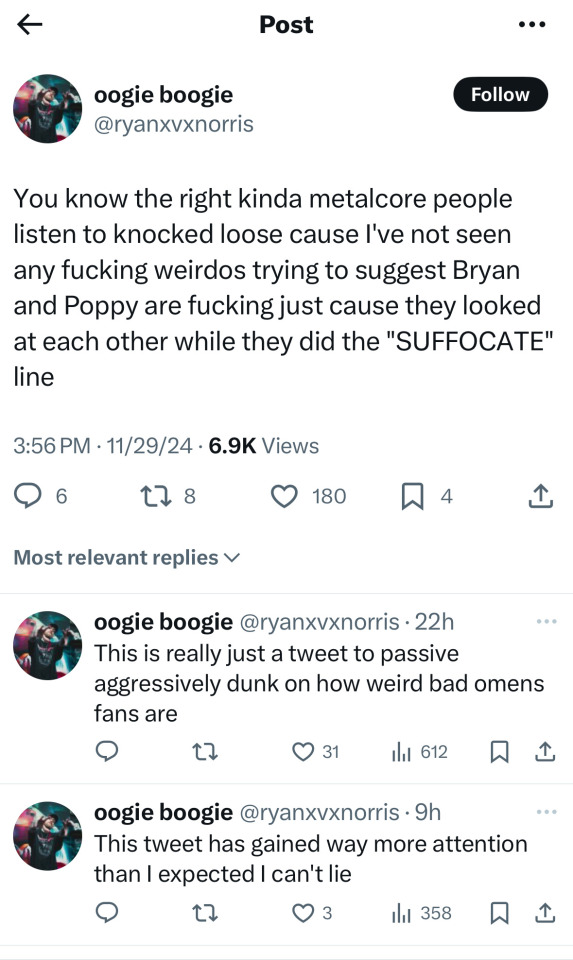
It sounds like this particular fan is suggesting that Bryan and Poppy are having a thing right after they looked at each other on Jimmy Kimmel.
Also blaming the bad omens fans for being weird?? How does that correlate to them having an idea if the Noah situation with poppy is real?
I mean would you rather get controversial and have the fans come after you?
Also who is this Andrew Davis??
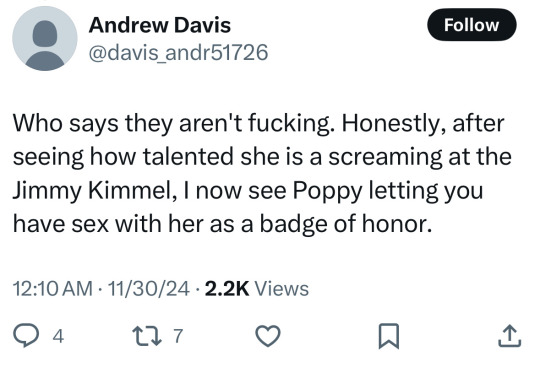
Obviously he was replying to the OG Poster.
I think they’re just rage bait, but I don’t think Poppy would have sex with anyone just because she’s famous right? I mean she was engaged in 2021 I think.
But what about Jordan and Poppy?
Like heck forget Noah and Poppy, like if Jordan was to date Poppy, what would happen to his kids? Is he divorcing his wife? Is he no longer happy in his marriage?
Also this leads to my question if Jordan and Noah are friends.
Also did anyone see Bad Omens on Jimmy Kimmel? Or was it just Knocked Loose?
There’s a lot of speculations, and a lot of rumors.
What do you think?
PUBLICITY AND FAME
So where I left off on paparazzi, there’s always going to be a publicity being made.
In this case we see it a lot more when bands are out in the public eye, and where they are being seen.
If Noah and Poppy aren’t being photographed everywhere they go, then it’s probably because the media organized the whole event. Not just to promote them but promote their work and their brand.
But don’t let that stop you from buying from Bad Omens or Poppy.
In all honesty Bad Omens is a great contributor for letting their fans enjoy music.
Whatever tea blog you have read that said Noah doesn’t care about fans, then they’re probably in the wrong.
Noah wouldn’t create a band, he wanted to create a band, but he wasn’t expecting to get big. Now that he has grabbed attention and fame, this gives him the chance to make more music and more money to his expenses.
Bad Omens makes sure that what you buy from them are good quality. They have a great support system and merch support team that allows the seller to communicate with the buyer if some of their merchandise arrives damaged.
They make sure each fan gets what that they enjoy the most.
JIMMY KIMMEL FORMAL APOLOGY
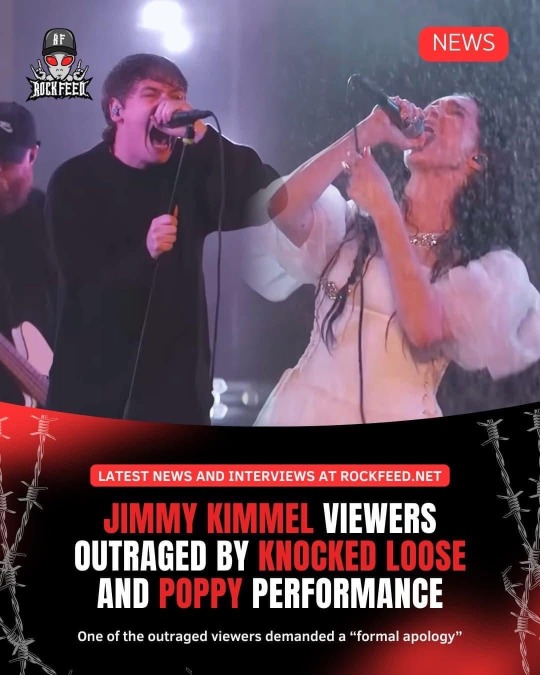
This leads to my last rant that I recently seen which is that various audiences that saw Knocked Loose on Jimmy Kimmel want a formal apology.
It sounds like Jimmy Kimmel is getting bashed over how many audience viewers complained about Knocked Loose performance on “SUFFOCATE”
Let’s be real for a second, in the music industry there’s always going to be a lot of hate.
But this is tea where some audience viewers just didn’t like the performance.
So I watched part of the clip on YouTube since I don’t really watch television. The performance of Knocked Loose I mean if I was being absolutely honest, it wasn’t good.
Poppy’s moaning and screaming felt like a kid trying to get ice cream from a parlor.
It didn’t really sound so good at all. Also Bryan, could’ve done more to his part in my opinion.
But since this was at Jimmy Kimmel, the audience didn’t like it. So they decided to get a formal apology from either Knocked Loose or Jimmy himself.
I mean if you hated the performance, I think there must have been better ways rather than asking someone for an apology that they brought a good band out there to perform, but if that’s what you think then I’m not gonna question anything more about it.
To me frankly when they came out and sang the song, I could not even understand a word they were saying.
It was like they didn’t even try to sing the lyrics.
Here are what other people have said:
Facebook user recounted the show’s impact on their teenage son, writing, “I was sitting on the couch with my son who is an ADOLESCENT waiting to see the musical guest because we like the nice music the show usually books. By the third or fourth ‘JUNT’ from the guitars my son was in tears. He doesn’t like scary things and quite frankly I think the Kimmel show and its staff should make a formal apology.”
Another “keyboard-warrior” detractor echoed the age-old metal critique: the lyrics were unintelligible, and the screaming was unbearable. “If I have to read the lyrics I’ll just read them and not listen to someone yell them”. Another frustrated commenter expressed disdain for the chaotic energy, saying, “This what not enjoyable. And you can’t understand more than 5% of the lyrics. Moshing doesn’t not equal dancing.” The confusion in their typos only seemed to amplify the melodrama.
A “music expert” went on to say it wasn’t even music: "How do I sing along with this??? Lol sounds just like a screaming frenzy to me!! Actually starting to hurt my ears!! People who listen to this have no room to complain about crying babies or screaming two-year-olds taking a tantrum!! Ha ha unreal!!! They call this music Jimmy??"
That’s a lot of hate.
I think having them collab with Poppy was a bad idea.
Other people can think otherwise. I don’t get why Poppy is so popular when they ask to collaborate with her in particular.
Why do bands like her?
This might seem like a big jump but I feel like they just want Poppy’s attention and time to make a good impression on their album. But with what’s been happening with Bad Omens and them having new bands or new starting artists as fans and audiences, the newer generation of new bands want to be just like them.
They’re taking a big interest on Bad Omens, more to where they are inspired to do what Bad Omens is doing.
All of this is very weird to me.
#bad omens#bad omens cult#spill the tea#poppy and noah#nicholas ruffilo#nick folio#jolly karlsson#noah sebastian davis#drama#noah sebastian
11 notes
·
View notes
Note
What if there was a K-pop based game? Not a Just Dance K-pop edition, but an actual game? What would the gameplay be like? Would you play or buy it? And who should be the first cover idol?
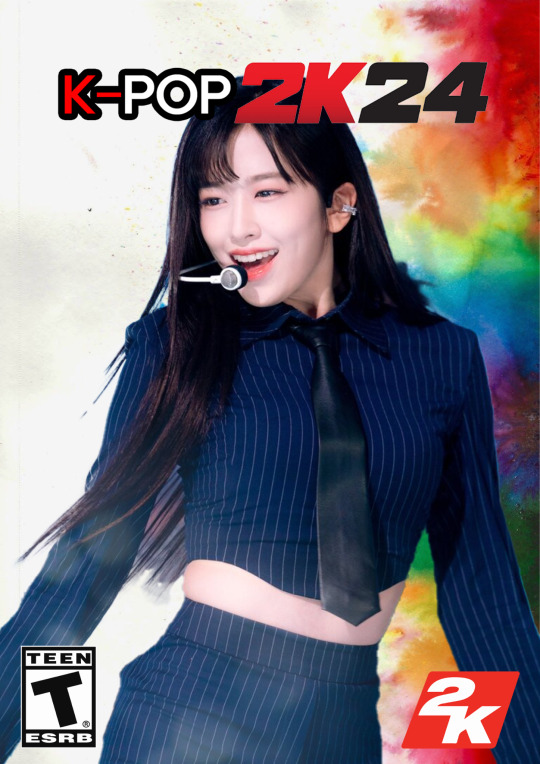

This honestly shouldn't be something I put so much thought into, and it's only scratching the surface, but there's so much material and concepts you could do with a K-pop based game. Other suggestions have already been tackled and explained tactfully, such as gameplay and Career/Story Mode, so here's a list of things and ideas I would like to see in a hypothetical game:
Cover idol:
I think if it’s not BTS or Blackpink, especially for the first game, you’d cause a huge riot. They are far and away the two most popular and recognized K-pop groups of all time, and are basically most Westerners’ gateway to the genre. It makes sense why not them, they’re currently inactive (esp. since BTS are in the military), but I’d argue that you should easily make two cover versions of the game—one with BTS, the other Blackpink. If it has to be one active idol, you could go with many options: Wonyoung, Karina, An Yujin, Yeji, Chaewon, Winter, Seulgi, Sana, Miyeon. It would be cool to have a foreign idol, but it has to be a Korean first, and I’d personally go with Wonyoung. For the Legacy/Legend Editions, I’d pick IU.
MyGM:
You could go three ways with a MyGM mode. Group based, company based, and music show based. All three will have similar gameplay elements, but have different ways and strategies to go about managing a successful group, company or music show.
MyIdol could be you as a singular group’s manager, scheduling comebacks, concerts, days-off, and so on during a calendar year. There’s a stamina/morale system to balance between working them for profit/popularity and resting them so that none of the members get disgruntled and leave or be sidelined. You’d also have to make decisions for the members’ solo opportunities, line distribution, and more.
MyCompany is larger in scale—you now run an entire company or sublabel (good luck if you’re running Cube or SM lmao). You have to manage every artist’s comebacks and schedules, or else they leave or demand a contract termination. An addition from MyIdol is the ability to sign other idols/artists/trainees on the free agent market and you can add them to existing groups or create new groups with your current roster.
MyMusicShow would basically be WWE 2K’s MyGM. You’re in charge of a music show/Korean TV station like KBS’ Music Bank or SBS’ Inkigayo and you have to compete with other networks for the best ratings of the week throughout a calendar year. You can negotiate exclusive contracts with other agencies so that their groups can only appear on your programs, as well as managing set designs/TV booking (who wins on your show)/screentime for the artists on your show.
Universe Mode:
What it says on the tin: you have control over the entire industry and decide who are the top dogs, create special collaborations, send groups on international stages, etc.
Showcase Mode:
Depends on who’s the cover idol: you basically replay some of their most iconic/legendary stages throughout their career. If it were someone like Wonyoung for example, it would include her Very Very Very performance from PD48, that one Love Dive baseball stage, K-Pop Flex 2022, her 2022 Melon Music Awards performance, and so on. You could also do one for whoever’s on the Legend/Legacy Edition cover.
Roster:
Depending on which companies are down for it, I expect all the current 4th/5th gen guys to be available from the start, while 3rd/2nd gen groups are labeled as Legends/Legacy and require some grinding to unlock (with few exceptions). Newer groups would probably be DLC or groups from prominent eras/releases (like 2018 TWICE or 2010 SNSD for example). TheLibrarian’s suggestion of having boy group/girl group only versions is also a possible option, but c’mon, if the NBA and WWE 2K games can include both their men and women’s rosters, I see no reason for the K-pop game not to do the same.
I put so much unnecessary thought into it for some reason, I even tried making concept covers of my own using my ideas and others (they're kinda bad XD). Sorry you had to read through all that.
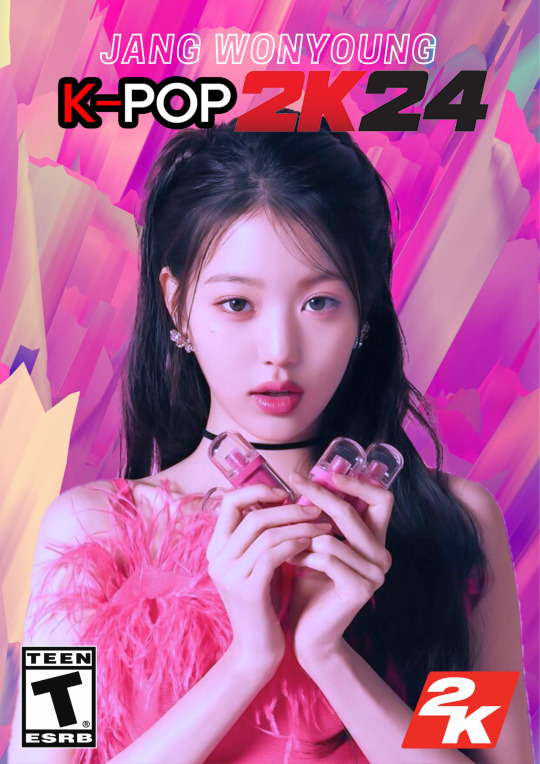
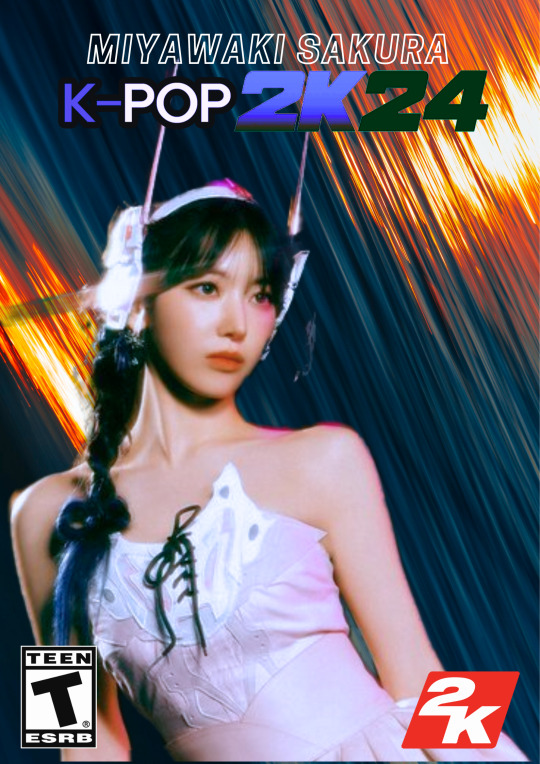
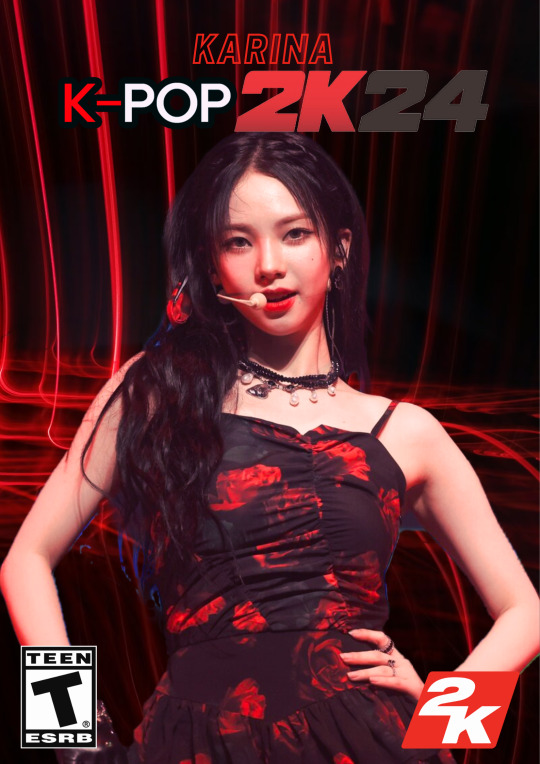

29 notes
·
View notes